Everything you need to know about getting around South Africa

Aug 27, 2023 • 6 min read

Hired taxis run in South Africa's major cities only, but Uber is available in most parts of the country © Masego Morulane / Getty Images
South Africa is the ninth-biggest country in Africa and figuring out how to get around efficiently takes some serious thought and planning.
How do you move between bustling cities and epic countryside safely, quickly and cost effectively without damaging the environment as you go?
Whether you're going by rail, road or air, here's everything you need to know about getting around South Africa .

Travel by plane if you're short on time
South Africa is almost five times the size of England and twice the size of Texas, so it can be worth taking to the air if you have a lot of ground to cover in a limited time.
South Africa’s main cities are well connected by convenient flights. The domestic airline with the most extensive network is Airlink , which flies through 17 South African airports, along with others in southern and central Africa. FlySafair is also reliable and recommended but reaches less than a dozen destinations.
If you have time constraints, flying is the best – though least climate-friendly – option for getting around South Africa. However, airports are often a considerable distance from the city, and it’s worth remembering that you will incur costs and travel time getting into the city center.
Almost every city and town is connected by bus
Greyhound pulled out of South Africa in February 2021 after nearly four decades of service, so Intercape and TransLux are now the major options for travelers moving between cities in South Africa. Both of these networks have efficient online booking systems and between them, they connect almost every city and town in the country with safe, comfortable and affordable vehicles. All long-distance coaches are equipped with air-conditioning and toilets.
Tickets vary according to distance and route, but figure on paying roughly R54 for each hour of traveling. In high season, specifically during the school Christmas holidays, prices can rise by as much as 30%.
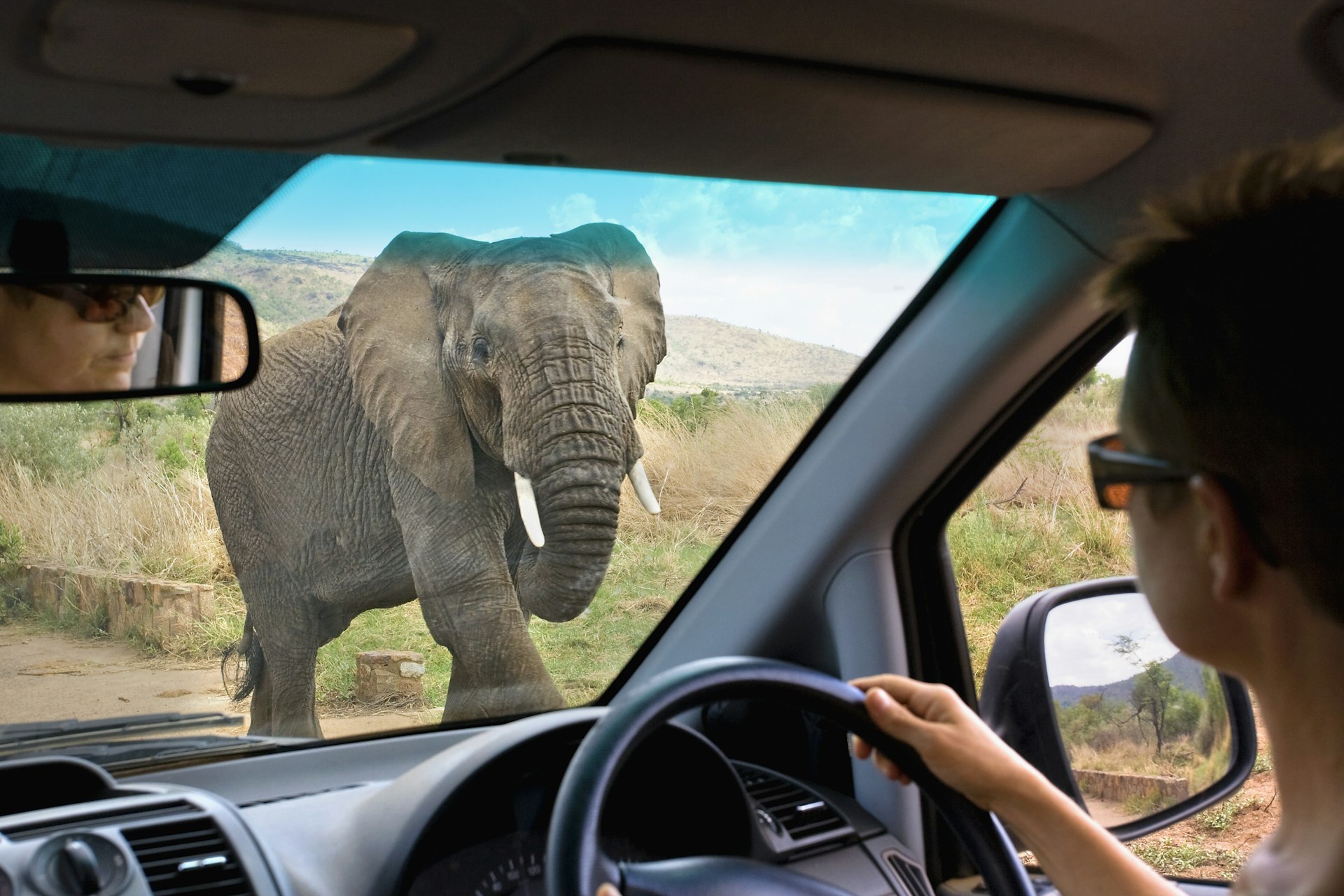
Renting a car will get you into wilderness areas and national parks
Public transport in South Africa is limited when it comes to remote, rural communities and almost nonexistent if you want to explore the wilderness and the all-important national parks and reserves. If you want to experience the thrill and charm of backcountry South Africa , you’ll need your own wheels.
The entire country is networked by top-quality and beautifully scenic roads, along with enough endless stretches of gravel top to appeal to any adventurous road-tripper. There are several reliable and relatively inexpensive car rental companies, including Avis , Hertz and Tempest Car Hire . If you’re traveling in a group, car rental often turns out to be the most affordable option, with rates starting around R540 per day. Prices are usually lower if you book in advance rather than upon arrival at the airport.
Bear in mind that many parks – specifically Kruger National Park and Addo Elephant National Park – have such excellent road infrastructure that a 4x4 is not necessary and, as long as you confine yourself to the tarmac routes, you can get around even in a small hatchback.
If you’re driving in a Big Five country, do some research regarding etiquette and safety precautions, especially in dealing with elephants. An environmentally sound 4x4 rental company is Tread Lite , which offers affordable, compact and delightfully quirky Suzuki Jimnys with all the necessary camping kit for a price tag of around R1547 per day, depending on the time of year and length of your stay. Tread Lite is also an absolute mine of information when planning your route.

Tour buses provide affordable, flexible travel in South Africa
Aimed at backpackers, Bazbus is a perfect option for solo travelers looking for a more sociable mode of transport. The hop-on-hop-off travel pass means that you can take as long as you want to go from A to B.
For example, a one-way hop-on-hop-off ticket between Cape Town and Port Elizabeth starts around R4700 and passes through the coastal highlights of the Garden Route , while an eight-day Bazbus travel pass lets you hop off and on as many times as you want in any direction for R4600. The company even offers a three-day all-inclusive Kruger safari from R12,200 per person.
Highly recommended, Oasis Overland offers a 17-day trip from Cape Town to Jo’burg that takes in most of the main sights, including Addo, Royal Natal National Park and even a visit to the mountain kingdom of Lesotho, for about R29,050. If you want to make South Africa part of a once-in-a-lifetime African trip, look into the 93-day Grand Adventurer trip from Nairobi to Johannesburg.

Trains in South Africa run from basic to luxury
If you’re not in a hurry, the train is often the most pleasant way of getting around South Africa. You can settle in for a relaxing overnight journey, watching the countryside slip past and chatting to fellow passengers. Sadly the tourist-class Shosholoza Meyl sleeper service is still not back to its pre-Covid operations but there are other options available with an unfortunately heftier price tag.
The Blue Train raises comfort levels to sumptuous extremes: you’re expected to dress formally for dinner, and the price tag can run to R67,715 for a trip from Pretoria to Cape Town. Meanwhile, on the luxurious Rovos Rail service, the four-day 1600km (994-mile) journey between Pretoria and Cape Town costs from R31,700, and you can carry on all the way to Victoria Falls in Zimbabwe for an extra charge.
Local taxis or minibuses are another inexpensive option
Be aware that in South Africa the word “taxi” is most commonly applied to the privately owned minibuses that connect virtually every town and village in the country. Often overloaded and dangerously driven, it is a mode of transport avoided by most people with sufficient funds to use another option.
If you decide to give it a shot, know that you won't have much room for luggage, the schedules are rarely set and you'll have to ask around to find out where to wait.
Hired taxis (normal sedans or hatchbacks) run in the major cities only, but the ubiquitous ride-sharing app Uber is a convenient, secure and reliable service that you can count on in most parts of the country.

Accessible transportation in South Africa
For travelers with mobility issues, South Africa might just be the easiest country on the continent to get around. Facilities include boardwalks and braille signage at the most developed national parks and reserves. Wheelchair users have easy access in getting around city centers, especially in Cape Town and Johannesburg.
Avis and Budget are the nationwide rental companies that supply vehicles with hydraulic lifts and wheelchair restraints. Disabled Travel is a great resource for listings, compiled by an occupational therapist, detailing a vast range of accommodations and resources for travelers with disabilities.
Durban-based Access 2 Africa Safaris runs everything from day trips to 12-day tours taking in Zululand, Kruger and eSwatini (formerly Swaziland). Travel with Renè is a fantastic tour operator that runs a range of exciting tours, including whale-watching and winelands tours, in the Cape area. Renè, a Black woman who became quadriplegic as a result of a motor accident in 1995, has a vehicle that can take six passengers, including three wheelchairs at a time.
South African National Parks has produced the Comprehensive Guide to Universal Access in South African National Parks for Guests with Disabilities , an excellent 24-page PDF.
Find more accessible travel information by downloading Lonely Planet’s free Accessible Travel eBook .
This article was first published February 2022 and updated August 2023
Explore related stories
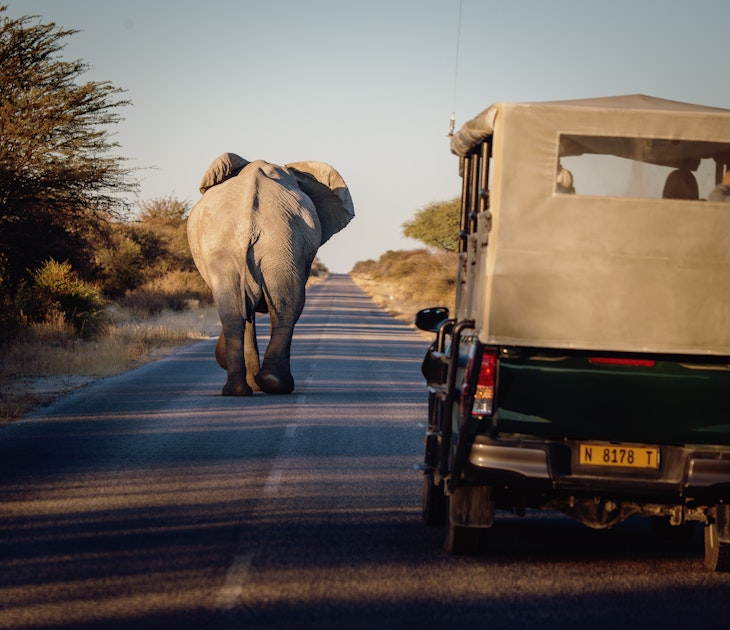
Accessible Travel
Oct 21, 2023 • 5 min read
There aren’t many places where you can drive for hours without seeing anything other than the occasional oryx. Here's how to get around in Namibia.

Mar 30, 2024 • 4 min read

Mar 19, 2024 • 6 min read

Mar 11, 2024 • 8 min read

Mar 10, 2024 • 5 min read

Feb 27, 2024 • 6 min read

Feb 20, 2024 • 17 min read

Feb 19, 2024 • 7 min read

Jan 30, 2024 • 9 min read

Jan 17, 2024 • 8 min read
All buses to and from South Africa

Popular bus routes in South Africa
- Cape Town to Durban
- Cape Town to Johannesburg
- Cape Town to Pretoria
- Durban to Cape Town
- Durban to Johannesburg
- Johannesburg to Bloemfontein
- Johannesburg to Bulawayo
- Johannesburg to Cape Town
- Johannesburg to Durban
- Johannesburg to East London
- Johannesburg to George
- Johannesburg to Harare
- Johannesburg to Kimberley
- Johannesburg to Maputo
- Johannesburg to Nelspruit (Mbombela)
- Johannesburg to Phalaborwa
- Johannesburg to Pietermaritzburg
- Johannesburg to Polokwane
- Johannesburg to Port Elizabeth
- Johannesburg to Richards Bay
Cities with the most bus connections in South Africa
- Bloemfontein
- Cape Town Airport
- Carletonville
- Durban - King Shaka Airport
- East London
- Johannesburg
- Johannesburg O.R. Tambo Airport
- Kempton Park
- Newcastle (ZA)
- Pietermaritzburg
- Port Elizabeth
- Richards Bay
- Vanderbijlpark
- Vereeniging

The CheckMyBus App
Free Download
We value your privacy!

The Ultimate Guide to Bus Travel in Africa
By: Author Zachary Friedman
Posted on Last updated: February 1, 2024
Categories Africa , Bus Travel
Home » Africa » The Ultimate Guide to Bus Travel in Africa
Bus travel in Africa is an adventure. Last year, I backpacked from Ethiopia to South Africa pretty much all by public bus. For many of the bus routes that I traveled, there just wasn’t much information online. The following step-by-step African bus guides include information on bus companies, pricing, departure and arrival times, border crossings, visas, and more. Pretty much everything you’ll want to know to make each trip.

Step-by-Step African Bus Guides
- Addis Ababa, Ethiopia to Nairobi, Kenya
- Nairobi, Kenya to Kampala, Uganda
- Kampala, Uganda to Kigali, Rwanda
- Kigali, Rwanda to Arusha or Dar es Salaam, Tanzania
- Dar es Salaam, Tanzania to Lilongwe, Malawi
- Lilongwe, Malawi to Lusaka, Zambia
- Victoria Falls, Zimbabwe to Bulawayo or Harare, Zimbabwe
- Maun, Botswana to Windhoek, Namibia
- Windhoek, Namibia to Cape Town, South Africa
If you are traveling through Africa independently, chances are you will be spending a lot of time on Buses. Between researching bus routes, locating the bus terminal, and actually riding the bus, it will feel like you are spending half your trip just dealing with buses. Hopefully, this guide will make the process just a bit easier.
African Bus Travel Notes
Traveling by bus in Africa is exhausting. They are hot, rarely stop, and are packed full of people. With that being said, African buses can be a great experience with the right mindset. Fellow passengers are friendly and interesting to talk to, the views are spectacular, and you get to experience some entertaining African film and music during the journey.
Bus travel is really the only option for traveling Africa on a budget. The African rail system is incredibly limited and flights are too expensive. There are two types of bus you will encounter in your journey: coaches and minibusses.
African Coaches
I recommend you take the coach if it is available for the route you are traveling. Benefits of traveling by coach rather than minibus include:
- Much more comfortable seating- The seats are generally in decent condition and are padded. They may even recline if you’re lucky.
- Not packed nearly as tightly as minibusses- Many countries do not allow coaches to be filled with more people than there are seats. Minibusses will be packed as full as possible.
- The journey will take less time- Coaches generally travel between major cities with few stops along the way. Minibusses stop every two minutes to pick up and drop off passengers.
- Fewer transfers- Coaches travel long distance. Minibusses generally travel shorter routes between towns. This means you may have to take 5 or more minibusses to get to your destination. Each transfer is stressful requiring that you find the next bus headed in your direction and move your gear from one bus to the next.
- Everyone pays the same price- When you purchase your ticket, the price will be printed in the office so that you know you are not being ripped off. Minibus drivers will try to overcharge you every chance they get.
- Better Security- Coaches are run by professionals. They care about their reputation so they will put in an effort to ensure that you and your belongings all make it to your destination safely and in one piece.
The only drawback to coaches is that they are slightly more expensive than traveling by minibus. Expect to pay $1-$2 per hour of travel for coach tickets.

African Minibusses
African minibusses are hell but are necessary for some sections of the trip. These small buses operate shorter routes between towns and as public transportation within cities. They are cramped, hot, and generally uncomfortable. With that being said, they do have some benefits over coaches.
- Minibusses leave when they are full, not on a schedule- For this reason, you may be able to get to your destination faster. You may not have to wait a day or more for the next coach while minibusses leave multiple times per day.
- Minibusses can take you more places- Wherever you want to go, chances are a minibus can take you there. You can access the furthest villages and outposts by minibus. Coaches generally only travel between major cities.
- Minibusses are cheaper- Expect to pay between $.50-$1 per hour of travel for minibus fare.
- You can just flag them down whenever- If they are going in your direction, they will stop and pick you up.
Minibusses also have some drawbacks. You may have to wait a few hours or more before the minibus leaves. In Ethiopia, I waited about 4 hours one morning for a minibus from Jinka to Dimeka to fill up. The driver wouldn’t leave until every single seat was occupied. I think a passenger eventually paid for two seats so we could leave.

Minibus Scams
- Minibus operators will often try to scam tourists by charging them a higher rate than locals. This infuriates me. Don’t be afraid to confront them if you catch them trying to overcharge.
- Watch your pockets. My phone was pickpocketed while I was getting off a minibus in Tanzania . Luckily I got it back. This is just one of the reasons why I’ll never return to Tanzania. For more tips, check out my guide: How to Avoid Pickpockets While Traveling.
- Many times, if you ask if a bus is going to a specific location, the answer will always be yes, even if it isn’t true. Some drivers don’t care where you are trying to go and will pick you up just so they can collect the fare. It’s best to ask several people, including passengers, where the bus is going. Sometimes it’s hard to get a straight answer. I’m not really sure if this is a scam or just a misunderstanding but it is something to be aware of.
For my complete list of scams, check out my article: 21 Common Travel Scams and How to Avoid Them.
Staying Safe on African Buses
Unfortunately, traveling on buses will likely be the most dangerous part of your trip to Africa. Auto accidents are not uncommon. For whatever reason, Africans like to drive fast. They don’t care about rough roads or blind corners. The following recommendations will help you stay safe:
- Pick the safest seat on the bus- Ideally, you want to sit on the aisle seat near the middle of the bus opposite of oncoming traffic.
- Travel in the newest, safest bus that you can- Newer buses have safety features that older buses don’t have.
- Ride in coaches rather than minibusses- In the event of an accident, you’ll be much less likely to be injured when riding in a coach.
- If you feel unsafe, get out of the bus and find another way to get to your destination- This is a hassle but there is always another way to get there.
For more general safety tips, check out my guide: Is Travel in Africa Safe? Avoiding Crime, Disease, Injury, and Scams in Africa and Is Uganda Safe?
Finding the Bus Station
The organization of buses is a mess in Africa. Some towns have big bus stations where you can purchase tickets and catch the bus. These are chaotic but manageable. Some towns just have bus companies offices scattered randomly throughout. Occasionally there are multiple ticketing offices and bus stops in the same city.
When searching for a bus you will need to find the ticketing office of the bus company that is going to your destination. Google Maps is pretty accurate for this if you know the name of the bus company. Another option is simply to ask a taxi driver or your hotel reception. They should be able to point you in the right direction.
Make sure to ask at the ticketing office where you will catch the bus when you buy the ticket. Generally, it will be right there, but sometimes there is another office or bus station that they will send you to.
Using the Bathroom While Traveling by Bus
The best advice I can give about bus travel in Africa is to not drink too much liquid before or during the journey. If you must drink, just slowly sip and try to control your intake. Drivers often go 6 or more hours without stopping for a bathroom break. There are no bathrooms on the bus. I would rather be dehydrated than suffer holding my pee for an entire day. When they do stop, it will sometimes just be on the side of the road where the bush is your toilet.
If you are having an emergency and can’t hold it any longer, you will probably have to beg or bribe the driver to stop. Worst case scenario, just tell him that you need to pee and hand him a few dollars in the local currency. He’ll most likely pull the bus over and you can go on the side of the road.
Snacks and Food on the Bus
To make the bus ride a bit more pleasant, pack some snacks for the road. Food options are limited along the way and you never know when the bus will stop. You are also at a greater risk of getting food poisoning at roadside stops. Cleanliness is hit or miss at these places. Also, you never know how long the food has been sitting out in the sun. Better be safe than sorry.
For snacks, I would usually bring a few packets of cookies and some fruit along. For all day journeys, I would bring a can of tuna and bread to make sandwiches along the way. Another option is to boil some eggs in the morning and eat them on the bus.

Border Crossings
Surprisingly, all border crossings that I encountered were fairly smooth and efficient. On average, crossing the border took less than two hours. Before boarding an international bus, do your research and make sure that the visa that you need is available at the border if you don’t already have it. For information on visas, you can read my African visa guide.
Luggage Storage on African Buses
Storing luggage on African buses works a bit different than you may be used to. African buses are often used to transport goods as well as people. Because of this, they are usually filled to capacity. Storing luggage on a coach and minibus is a bit different.
Storing Luggage on an African Coach
While traveling by coach, your ticket usually includes one large piece of luggage plus a carry-on. The larger piece is stored in the luggage compartment below the bus if it doesn’t fit in the overhead compartments inside.
When the bus begins boarding, simply wait by the luggage compartment until the handler takes your bag. Sometimes you have to just crowd in if no line forms. Usually, the luggage handler tags your bag and hands you a ticket. This process is the same as anywhere else.
In my experience, there are no hard rules when it comes to weight or size limits of your luggage. My backpack was never weighed or measured. If you’re carrying two large items, you may be asked to pay an extra dollar or two. The luggage handler may also ask you for a tip while loading your bag. It’s up to you whether or not you want to give him anything. I recommend not tipping.
Overall, storing luggage below the bus is pretty safe. Of course, theft is a risk just like anywhere. I don’t believe rates of theft are particularly high on African buses, but I’m sure it does happen occasionally. I never had a problem. The best thing you can do to lower the risk is to travel with reputable bus companies. They take security more seriously.
Tip: Carry any valuables or fragile items such as computers, cameras, cash, etc. in your carry-on bag. Keep this bag on your person at all times. Even though theft is unlikely, why risk it? If you’re worried about theft, consider packing ultralight so you can always carry your bag on the bus.
Storing Luggage on African Minibusses
This process depends on the minibus and the size of your luggage. In some places, your luggage is included in the fare and sometimes you pay by the bag. Really, it just depends on how well you can negotiate. On an African minibus, you store your luggage in one of 3 places.
- If you travel light like me, you may be able to simply store your bag on the floor under your legs or on your lap. While this isn’t the most comfortable, it is the most secure.
- If your luggage is larger or the minibus is packed full of people, the driver may store your bag in the back of the bus behind the last row of seats.
- If the bus is packed completely full, you may have to store your bag on top of the bus. A luggage handler will throw or carry your bag to the roof and simply lash it down with some rope. This isn’t ideal but sometimes it’s the only option. I hate having to worry about my precious backpack bouncing off the bus and being lost in the bush.
If you need to store your luggage in the back of the bus or on the roof, I recommend you remove any valuables or fragile items and carry them in a small bag on your person. This reduces the risk of theft or damage. African baggage handlers aren’t too gentle with the luggage.

Final Thoughts on Bus Travel in Africa
Things change fast in Africa so parts of these guides may quickly become outdated but the general information should hold up. I thoroughly enjoyed traveling through Africa by bus and plan to return to the continent soon. Hopefully, you found this information helpful in planning your trip.
If you’re not sure if independent bus travel is for you, check out my guide to help you decide Africa overland tour Vs. Independent Travel: My Pros and Cons List
Have you traveled by bus in Africa? Share your tips and experience in the comments below!
More Africa travel resources from Where The Road Forks
- How to Plan a Cairo to Cape Town Trip
- Living in Uganda as an Expat: Pros and Cons
- Is Travel in Africa Safe? Avoiding Crime, Disease, Injury, and Scams
- 15 Great Rift Valley Lakes to Visit in East Africa
- 21 Best Things to do in Nairobi, Kenya
- Touring the Omo Valley Independently on a Budget
- How to Safari in Kenya for Less Than $200: Massai Mara on a Budget
Zachary Friedman is an accomplished travel writer and professional blogger. Since 2011, he has traveled to 66 countries and 6 continents. He founded ‘Where The Road Forks’ in 2017 to provide readers with information and insights based on his travel and outdoor recreation experience and expertise. Zachary is also an avid cyclist and hiker. Living as a digital nomad, Zachary balances his professional life with his passions for hiking, camping, cycling, and worldwide exploration. For a deeper dive into his journey and background, visit the About page. For inquiries and collaborations, please reach out through the Contact page. You can also follow him on Facebook.
Sharing is caring!
Sign me up for the newsletter!
- Travel Website
- Travel trade website
- Business events website
- Corporate & media website
- Welcome to South Africa
- What you need to know
- Things to do
- Places to go
- Get in touch
Choose your country and language:
- South Africa
Asia Pacific
- South Korea
- Netherlands
- United Kingdom
By creating an account, I agree to the Terms of service and Privacy policy
Getting around South Africa by bus
T T he extensive road network in South Africa means that bus or coach travel is a simple and often very cost effective option for travellers. It has become the go-to travelling option for the more economically-conscious locals and many international travellers choose coach tours or bus travel as a hassle free option. It's a wonderful way of relaxing and taking in the astounding scenery between destinations.
There are a number of bus and coach operators, offering a great range of products for every price point. Some of these trips even include being served coffee and biscuits with a selection of movies to entertain you while en route to your destination.
If you're on a back-packing holiday across South Africa wanting to explore smaller out of the way places, Baz Bus offers a hop on hop off network that takes you door to door at your leisure.
You will be glad to know that some companies offer cross-border trips in case you want to visit neighbouring countries in Southern Africa such as Botswana, Mozambique, Namibia and Zimbabwe.
Who to contact
Greyhound Tel: +27 11 611 8000 Email: [email protected] https://www.greyhound.co.za/
Intercape Tel: +27 21 380 4400 [email protected] http://www.intercape.co.za
Baz Bus Tel: +27 21 422 5202 Email: [email protected] http://www.bazbus.com
South Africa on social media
The BMW International Open has made us excited for the BMW Golf Cup World Final to be hosted in SA. We caught up wi… https://t.co/XiU3waBo1T
Always a pleasure partnering with local businesses to promote SA on the global stage. Warren Weitsz, Co-Founder of… https://t.co/YRxoX6Jdtx
To say the players are bringing their A-game is an under statement! Round 2 has given us many unforgettable moments… https://t.co/4bBdAuXMUL
"...Patrons have been keen and interested in engaging on where the best fairways in SA are. Paired with some of our… https://t.co/tIoXM2uUrh
Our stand at the BMW International Open has been drawing a lot of attention – and rightfully so! “We are proud and… https://t.co/ulYSTje4CB
Clear skies, rolling greens, supportive crowds – the conditions couldn’t be better for a day at Golfclub München Ei… https://t.co/3TMmUxsN0m
What happens when an amateur and pro hit the fairway together? Find out in the Pro-Am Tournament, where 3 amateurs… https://t.co/hkvHUw0H0E
Ready to get into the swing of things? The Pro-Am Tournament of the 2023 BMW International Open starts today in Mün… https://t.co/WqLU7FshdH
South Africa has many exquisite golf courses. As we gear up for The BMW International Open in Germany, we hope to s… https://t.co/vTFwgOa78W
South African Tourism will be showcasing our beautiful country's offerings in Germany! We have so much to offer glo… https://t.co/O1m4yVy491
#DidYouKnow South Africa has produced some of the top golfers in the world. As we gear up for the BMW International… https://t.co/E1GsW6z1Fy
#DidYouKnow ? #VisitSouthAfrica ❤️🇿🇦 https://t.co/Y4zWjb8xIz
RT @Roberto_EUBXL: Amazing #YouthDay2023 long weekend in @MidlandsMeander ! Another 💎 of multifaceted #SouthAfrica : touches of 🇬🇧 🇧🇪 🇱🇺 co…
What does golf, South Africa, BMW and Germany have in common? The 34th staging of the BMW International Open in Ger… https://t.co/YdvuWOjs8O
Golf was first played in South Africa in 1885, in Cape Town. Now we are taking our love of golf to the world, as we… https://t.co/dXc5uIyGxI
RT @PublicSectorMan: Today marks 47 years since the youth uprising of 16 June 1976. Deputy President Paul Mashatile will lead the commemor…
We look forward to showcasing South Africa’s abundant tourism offerings to a global audience while reminding them a… https://t.co/yVz97hDGaa
A dynamic collaboration between SA Tourism and the iconic BMW Group is set to supercharge the country’s efforts tow… https://t.co/JhLDwHlLix
50 days until the kick-off – or shall we say the tip-off – of the Vitality #NWC2023 in SA! Excitement levels are at… https://t.co/Ni2fHwh2NJ
#VisitSouthAfrica ❤️🇿🇦 https://t.co/ApcA6wNNop

- Useful links
- Travel partners
- Business events
- Travel trade
- Accommodation
- Useful contacts
- Visa & entry info
- Digital Assets Library
- Image Library

Why Travel With Us
How It Works
- Who Travels With Us
- Tickets & Trips
- VIEW ALL DAY TRIPS FROM CAPE TOWN
- Cape Peninsula Day Tour
- Hermanus Marine Big 5 Day Tour
- 2 Day Safari from Cape Town
- Full Day Safari from Cape Town
- Stellenbosch Vineyard & Wine Tasting Day Tour
- 2 Day Combo Tour – Vineyards & Sea Safari
- VIEW ALL DAY TRIPS FROM PORT ELIZABETH
- Addo Elephant Park Full Day Tour
- Addo Elephant Park 2 Day Tour
- Kruger Safaris
- Blackwater Tubing (Storms River)
- Canyoning Trip (Plettenberg Bay/The Crags)
- Bloukrans Bungee Jump
- Quad Bike Game Drive (Mossel Bay)
- Knysna Township Tour
- Port Elizabeth
How it works
Bazbus is all about discovering the REAL South Africa through the eyes of a local. Our drivers know the hidden gems, the stops between the stops that tourists would never find, and are also happy to share stories of what life was and is like in South Africa along the way. An authentic local experience in a safe, flexible and fun way! Read more below about what Bazbus is and how it works!
There are a few ways to travel within South Africa
- Planes (you will miss a LOT of stops not served by Airports, such as all the garden route stops)
- Public Buses (complicated, safety issues as well as missing a lot of hidden gem stops and towns)
- Rent a Car (Don’t meet other people, miss hidden gems not in guidebooks, no local expert, expensive when fuel and parking costs added up, safety issues are common)
- Guided Tour (Very expensive, no flexibility to choose what you want to do and when you want to do it, can’t stay anywhere longer)
- Bazbus (Safe, Flexible, Fun, and inexpensive compared to other options)
How Bazbus works
Comfortable and modern buses
Our buses allow you to get to places (hidden gems) that are impossible to get to on public transport, but also give you the safety and comfort your holiday deserves with local, expert drivers and the best safety standards, as well as offering hotel pickup and drop off at each stop.
Unique hop-on, hop-off system
This means you choose what to do, where to eat, and how long you spend at each destination, putting you in full control of your trip. Love a destination? Hop off and stay there as long as you like! Short on time? Skip through a destination quickly whilst seeing its main attractions.
Perfect pass for everyone
Whether you want a fully planned trip in advance, or just hop on and decide as you go, Bazbus is perfect for every type of traveler. It offers the benefits of being in full control combined with the benefits of a tour (meeting people and discovering places not accessible on public buses)
Local, expert drivers
Our South African drivers know this country much better than any guidebook. For example, the Lonely Planet is released every 2/3 years, and is written by foreign tourists. Our drivers are locals who have lived here all their life and spend every day traveling this incredible country.
Firstly, let us explain how public buses in South Africa work and then explain how Bazbus works so you can understand a little about the difference. It’s best to always compare your different options to find the best one!
How BAZBUS travel works
- Book 1 single bus pass that covers ALL bus journeys – no need to research bus tickets and routes!
- Hop on the bus at your Start Destination - we pickup at your hotel/hostel, no taxis needed! (Airbnb can meet at our offices)
- Get off the bus at any stop you like. We have stops at all the best towns, villages and hidden gems along the way based on our 30 years of experience to ensure you can discover places not even in the guidebooks.
- Use your unique login code to manage all your bus times and dates from your phone, or WhatsApp us whenever you want to get on the next bus. Buses operate every single day so you have complete flexibility and control over your experience.
- Cover the route as quickly as you like or take as long as you like. Ask our onboard South African expert for any tips or advice along the way!
- Meet fellow travelers on board from all over the world...many of our passengers make friends and end up traveling to various destinations together!
- Don't worry about who has to drive the next morning if you are thinking to have a glass of wine or a couple of beers at dinner! Don't stress about where to park the car or worry about driving at night...Bazbus is 100% stress-free so you can truly enjoy your once-in-a-lifetime experience in South Africa.
EASY. SAFE. UNIQUE.
Want more details on how Bazbus works?
Below is our simple guide to help you understand how our service works in 5 simple steps.
5 simple steps on how Bazbus works
Choose a pass.
Choose from our variety of passes, depending on where you want to start, where you want to go and how much time you have. Check our passes section for more information.
Plan your itinerary
Our passes are perfect for everyone, whether you want to squeeze it all into a few days or stay somewhere for a longer period of time.
Start your trip
Get picked up from your hotel or hostel and start your trip! At every destination, we will pick you up and drop you off wherever you are staying.
Hop-on & hop-off
You decide how long to stay at each stop. Stay one night or one month, it’s up to you! Your pass will be valid for one whole year. Simply log into your HOP LOGIN account and change your itinerary on the go.

Finish your trip
Finish your trip and leave us feedback and continue enjoying South Africa with exclusive discounts and more!
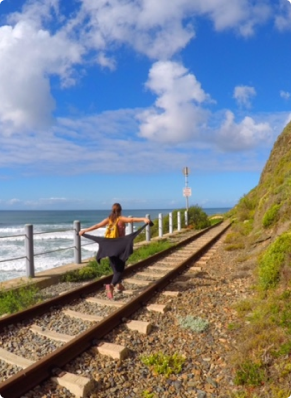
Bazbus vs Renting a Car
Below is a quick comparison of Bazbus vs Renting a Car and why Bazbus is safer, easier, cheaper and more fun!
We understand your needs!
- It’s not always easy traveling through South Africa due to worries about driving at night or getting lost.
- What do you do in an emergency when driving? Who is your local contact to help you out?
- What if you book a fixed itinerary tour but then find somewhere amazing and want to stay longer?
And that’s why we created Bazbus in 1995!
We GUARANTEE that Bazbus is the only way to discover the REAL South Africa, with our onboard drivers happily sharing stories about how life was and is in South Africa, as well as being able to assist and advise you with anything along your trip. Our drivers (now famous on Tripadvisor) are not only there to help you get around safely, but to help you see South Africa through the eyes of a South African.
Bazbus is a proud local South African company employing local staff, and our aim is to ensure you have the best possible once-in-a-lifetime trip through this amazing country. We are always here to help and our onboard assistants are famous for their care and attention, while also leaving travelers enough space and freedom to explore at their own pace.
As we like to say: “Travel independently, but never alone.”
Want to know why Bazbus is perfect for you? Click below to see Who Travels on Bazbus
Interested in traveling on the Bazbus? Click below to see our Tickets & Trips
Learn more about Baz Bus
COPYRIGHT © 2024 - BAZBUS

- 011 611 8000
- [email protected]
Travel with Greyhound. South Africa's favourite luxury coach solution
Online bookings.
Book your tickets online from the comfort of your own home
Phone Bookings
Our call centre operates 07:30 to 20:00 on weekdays and 07:30 to 13:00 on Saturdays and Sundays
Booking Offices
Book your tickets in person at one of our many booking offices
Popular Routes
Tshwane / johannesburg to durban, durban to johannesburg / tshwane, tshwane to cape town, cape town to tshwane, tshwane / johannesburg to east london, east london to johannesburg / tshwane, gqeberha to johannesburg / tshwane, tshwane / johannesburg to gqeberha.

Since 1984 Greyhound has brought you South Africa’s favourite luxury coach solution, connecting cities as old as the country itself and towns as brilliantly curious as the cultures that connect us.
Greyhound will continue to be the safe and reliable luxury coach traveling partner with high standards and morals. When luxury yearns for affordability, our liners shine the brightest. Our Dreamliners are built to 5-star specifications and an experience defined by professionalism, punctuality and good ol’ fashioned politeness.
Greyhound Travel Options
Luxury dreamliner, single decker.
As the leading solution for luxury coach bookings in South Africa, the question is, where can Greyhound take you?
We are giving away R2000 every weekday until the 30th of September 2023 with our Greyhound Cash Grab Competition. Follow us on social media to find out how to enter and win big!

Find cheap bus tickets for your next trip
Easily compare and book your next trip with Busbud
Popular routes in South Africa
People from around the world trust busbud, we’ve partnered with the world’s most popular bus companies.

Top traveled bus routes
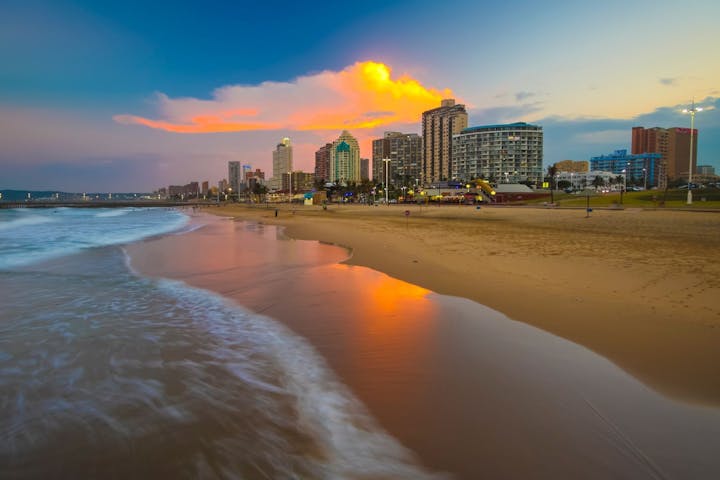
Popular countries across the world
With Busbud, you can travel by bus and train in more than 80 countries in the world! Enjoy your trip with a seamless and hassle-free experience while respecting the environment by using sustainable modes of transportations.
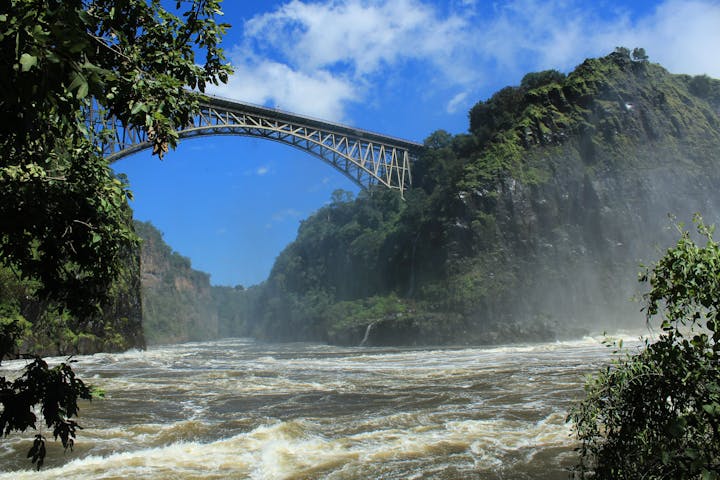
- United States
Why join Busbud?
Faster booking and checkout.
- Manage and cancel your trips with ease
- Save your payment method and billing information
- Save up to 5 passengers to your account!
Top bus companies in South Africa
South Africa is a country where taking the bus just makes sense: it’s convenient, affordable, and a simple way to get from city to city. Travelers can choose from dozens of bus companies that offer different classes of services, providing the opportunity to find the service that best suits everyone's travel needs and budgets.
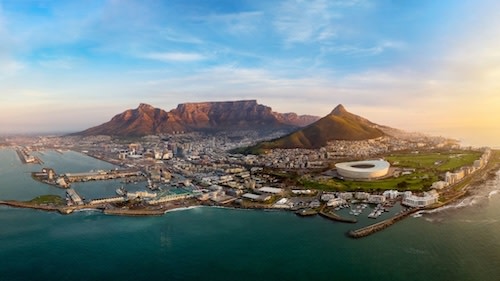
Choosing budget-friendly options may mean occasional delays and basic amenities while investing a little more means having a more comfortable journey with features like air conditioning and entertainment.
Greyhound ZA
Greyhound ZA is one of the most popular bus companies in South Africa. Greyhound ZA has two types of buses: Greyhound premium/Luxury Dreamliner, with extra legroom, charging ports, bathrooms and comfortable seats, and Greyhound lite/single decker that offers a more affordable experience, but also comfortable and convenient. These coaches are equipped with air conditioning, bathrooms and reclining seats.
*Citiliner bus company is now part of the Greyhound ZA group, and their buses were rebranded to Greyhound Lite.
Intercape is the largest intercity passenger transport service operating in South Africa, Namibia, Botswana, and Mozambique. Intercape has a fleet of coaches that are equipped with air conditioning, reclining seats, and onboard entertainment. The company operates a network of routes that cover most parts of the country. They offer four bus classes: sleepliner (first class), mainliner (executive), budgetliner (economy), and Inter-connect (shuttles), each with its own features.
IntercityXpress
IntercityXpress has daily scheduled trips to and from the East Rand in Gauteng and the South Coast in Kwazulu-Natal, including Margate and destinations located between Johannesburg and Durban. IntercityXpress also offers a luxury bus service at an affordable price to passengers commuting from Gauteng to KZN or Zimbabwe.
- Eagle Liner
Eagleliner bus company connects South Africa’s largest cities and beach resorts. The company has two types of buses: luxury and economy. They are known for having the most affordable fares in the country, so if price is your main concern, this might be the bus company for you.
Big Sky Bus
Big Sky offers passenger transportation to more than 60 destinations in the country. Their luxury and semi-luxury buses are equipped with reclining seats, air conditioning, bathrooms, and USB ports. The company offers reliable services, competitive prices, and comfortable rides.
Book your bus tickets online
Booking bus tickets with Busbud is a convenient and reliable way to plan your bus travel in South Africa and everywhere in the world. There are several benefits to using Busbud for booking your bus tickets, including:
Find a wide selection of bus companies Busbud partners with numerous bus companies in South Africa, but also in Zimbabwe, Botswana , Kenya, Namibia, and Mozambique and more making it easy to find the right one for your travel needs.
Count on an easy and secure booking process Busbud is user-friendly and provides a secure booking process that accepts multiple payment methods, including credit cards and instant EFT.
Easily compare prices Busbud's platform allows you to compare bus ticket prices across different bus companies, making it easy to find the most affordable option for your travel needs.
Enjoy the convenience of the mobile app The Busbud mobile app provides an easy-to-use platform for booking bus tickets on the go. You can search and compare bus ticket prices, view bus schedules, and book your tickets with ease.
Earn rewards and exchange for travel credits GO with Busbud , our loyalty program, allows you to accumulate credits for every trip you take. These credits can be redeemed for discounts on your future journeys. The more you travel, the more you save!
Travel experience
With buses connecting almost every city in the country, you can easily travel from coast to coast without flying. Yes, some trips may be long, so you should do your research to make sure you find the most convenient and comfortable ride for a hassle-free trip.
Here's what you can expect from buses in South Africa:
The level of comfort on the buses can change drastically from one company to another and also depends on the bus class you choose. In general, the country's long-distance buses are equipped with bathrooms, reclining seats, and air conditioning. These three basic conveniences make the trip more pleasant, but keep in mind you can find companies offering additional amenities such as Wi-Fi, power outlets, and extra wide seats.
Affordable fares
Bus travel is an affordable way to explore South Africa. Bus fares are generally considerably cheaper than flying or driving. As an example, a bus trip from Cape Town to Johannesburg costs on average R 680, while a flight costs on average R 2449.
Scenic Routes
South Africa has diverse landscapes, and bus travel offers stunning views of mountains, forests, beaches, and wildlife reserves. The scenic routes are perfect for nature lovers and provide a unique opportunity to appreciate the country's beauty.
Bus delays are common in South Africa, due to traffic and other unforeseen circumstances. When choosing a bus ticket, compare punctuality rates on Busbud to minimize your wait time.
South African roads are safe, and the buses are generally well-maintained and driven by experienced drivers. But, as in any other place, it’s important to remain vigilant at all times, keep your belongings with you, and respect the safety instructions given by staff or the driver.
What are the most popular bus routes?
- Bus from Butterworth to Cape Town
- Bus from Kimberley to Johannesburg
- Bus from Cape Town to Durban
- Bus from Johannesburg to Mthatha
- Bus from Johannesburg to East London
- Bus from Cape Town to Pretoria
- Bus from Johannesburg to Bloemfontein
- Bus from Cape Town to Port Elizabeth
- Bus from Johannesburg to Pietermaritzburg
- Bus from Johannesburg to Queenstown
- Bus from Johannesburg to Nelspruit
- Bus from Pretoria to Polokwane
- Bus from Bloemfontein to Kimberley
- Bus from Johannesburg to Matatiele
- Bus from Bloemfontein to Welkom
Most popular airports and destinations
- Johannesburg to Johannesburg Airport
- Durban to Durban Airport
- Pietermaritzburg to Johannesburg Airport
- Kimberley to The Edward Durban
- Standerton to The Edward Durban
Where would you like to take the bus next?
- Buses to Johannesburg
- Buses to Cape Town
- Buses to Durban
- Buses to Pretoria
- Buses to Bloemfontein
- Buses to Port Elizabeth
- Buses to Mthatha
- Buses to East London
- Buses to Pietermaritzburg
- Buses to Queenstown
- Buses to Kimberley
- Buses to Midrand
Which are the most popular bus companies?
- Intercity Xpress
- Greyhound South Africa
- Delta Coaches
- Africa Passenger Motors
- Makalala Transport
- WILLIAMSCOACHES
- WEZWECOACHES
- KM LUXURY COACHES
- Jacobs Coaches
- LUVALOBROTHERSTRANSPORT
- Pacific Blues
- MB Transport
- GracaLuxuryCoaches
- TIMBOONCOACHES
- LUCIANO LUXURY COACHES
- BESTEXPRESSLOGISTICS
- TEMSLOGISTICS
- MZANSIEXPRESS
Interested in more? Receive travel deals, trip reminders and other updates by email!
Nomadic Matt's Travel Site
Travel Better, Cheaper, Longer
How to Travel Around South Africa
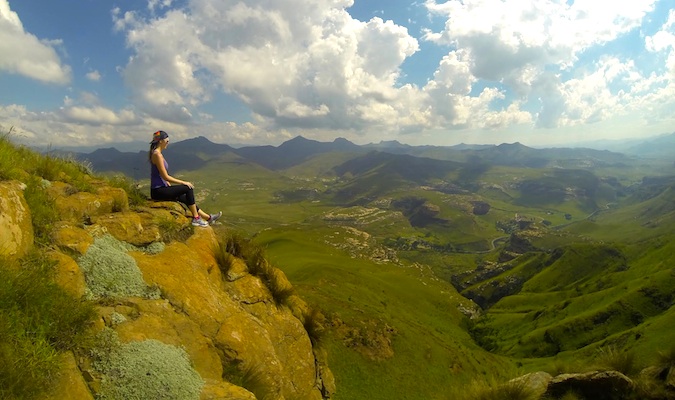
Kristin Addis from Be My Travel Muse is an expert on on solo female travel. It’s an important topic I can’t adequately cover, so I brought her in to share her advice. In this post, she shares her advice on traveling South Africa.
When I started planning my South Africa trip, a lot of questions went through my mind:
Is a country that big easy to travel around?
Is it expensive?
Is it safe?
The resources I found online were vague, negative, or simply nonexistent. I’d have to either cancel my trip or dive in and figure it all out for myself.
I chose the latter.
After traveling through the country for close to two months, I discovered a wide variety of reasonably affordable ways to navigate South Africa safely and easily.
To help you do the same, here’s my breakdown of how to get around South Africa on a budget:
Table of Contents
Traveling South Africa By Bus
Traveling south africa by air, traveling south africa by car, traveling south africa by train, how to stay safe in south africa.
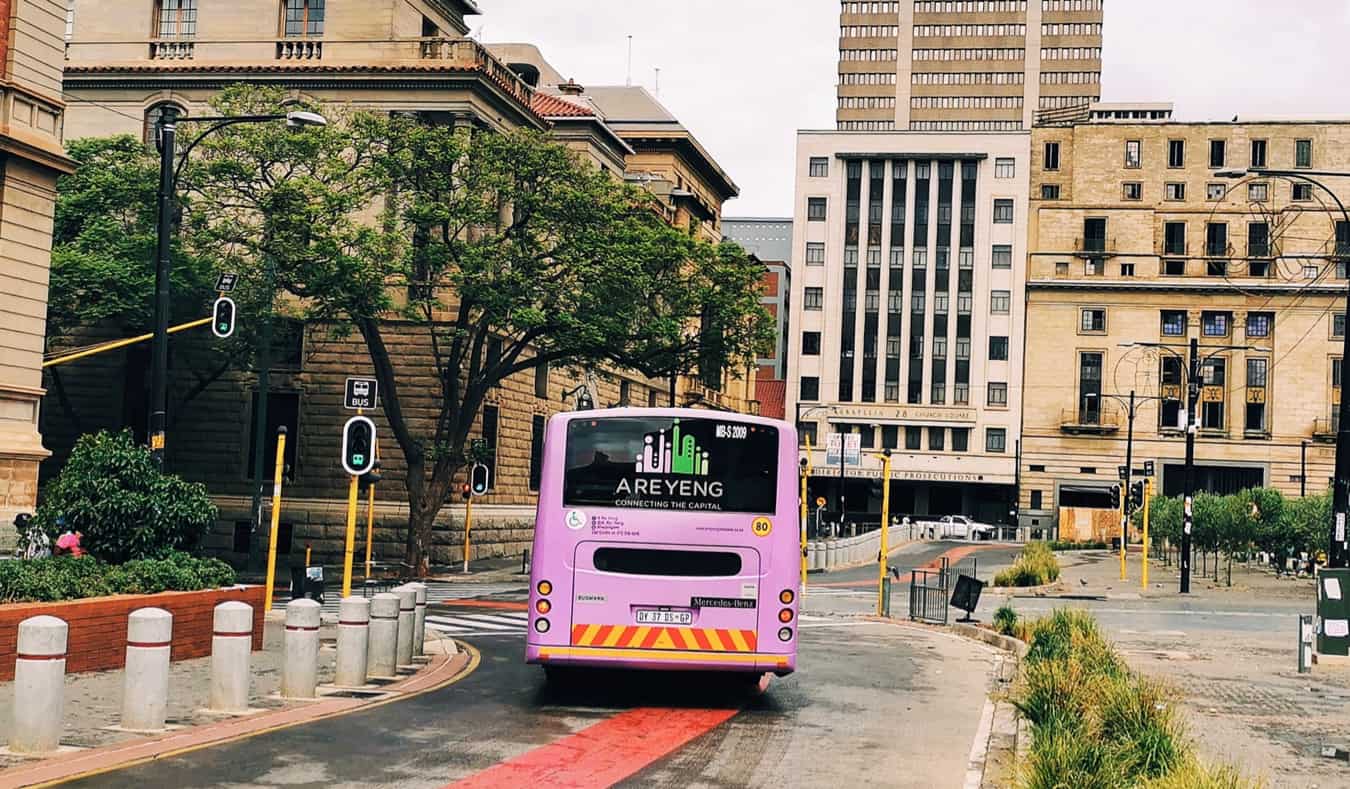
Baz Bus runs a route from Port Elizabeth to Cape Town (or vice versa) with several stops along the way. You can hop on or off whenever you want and can begin your trip anywhere, but as those two cities have major airports, most people start in one or the other.
( Matt says : I’ve taken similar buses in New Zealand and Australia . They can be good for people who want to meet other travelers.)
The most popular Baz Bus option is the unlimited one-way hop-on/hop-off pass. It costs 3,700 ZAR and covers the 750 kilometer distance between Port Elizabeth and Cape Town. You have no time limit and have unlimited travel in one direction, allowing you to have as many stops as you want. A return pass costs 4,800 ZAR.
Baz Bus is not a big money saver, as the fares are more than the train and other bus companies, but it is a convenient option for those who are happy to travel along the popular routes and meet other backpackers. The route includes the big cities in South Africa, popular spots along the coast, and the famous Garden Route in the Western Cape.
The drawbacks to taking the bus include dealing with a lack of transport once you’re at your destination, though shuttles to various local attractions, such as the bungee jump in Wilderness, are sometimes available at an additional cost. You’ll also need to be flexible with your schedule since the shuttles don’t run every day.
The biggest drawback for me was that the buses run along one set route and only go to the most popular tourist destinations and drop off only at certain backpacker accommodations. So, for those who like to head off the beaten path, it’s not a great option.
For comparison, a Greyhound or Intercape bus from Port Elizabeth to Cape Town will cost around 280-460 ZAR each way. Bus tickets from Johannesburg to Cape town cost between 370-930 ZAR each way. The journey is around 18-20 hours. The buses are large, air-conditioned, comfortable, and filled with locals, not backpackers.
Be sure to bring along snacks (and water) as well as some entertainment, as the buses run on a tight schedule and most stops are very brief, if they happen at all.
During the high season (December and June through August), you should book ahead as buses fill up quickly.
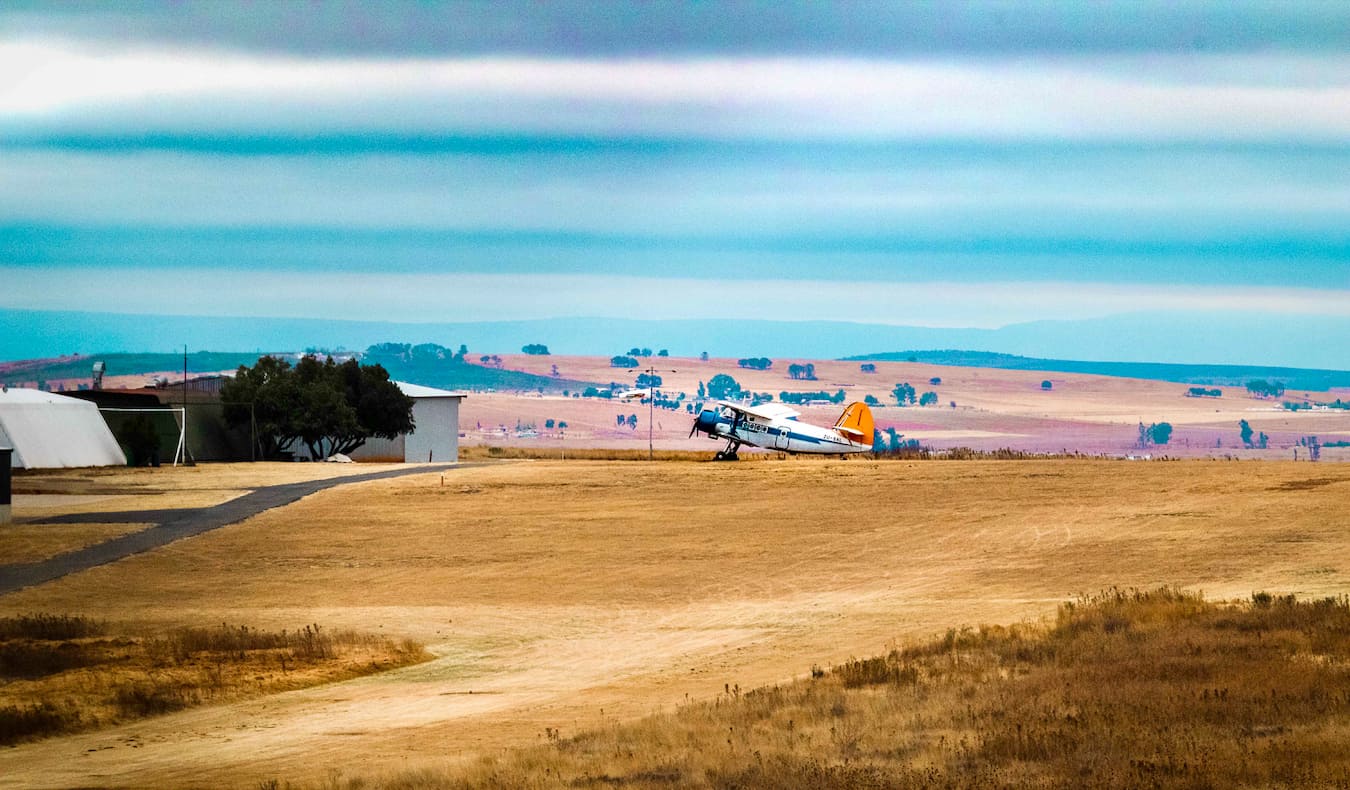
Even last-minute flights, as long as they still have quite a few seats left, tend not to go up in price if it’s a major route. For a last-minute planner like me, that was a real treat! For less common routes or smaller airports, prices go up the closer the date is.
Unsurprisingly, inconvenient times and early morning flights tend to be the cheapest. As with most budget airlines the world over, checked baggage and meals onboard cost extra.
While flying is probably the cheapest option, it’s also the least sustainable . And, when you factor in getting to and from each airport you don’t end up saving a huge amount of time if you’re just traveling a short distance.
However, if you’re on a tight schedule then flying is probably your most budget-friendly option.
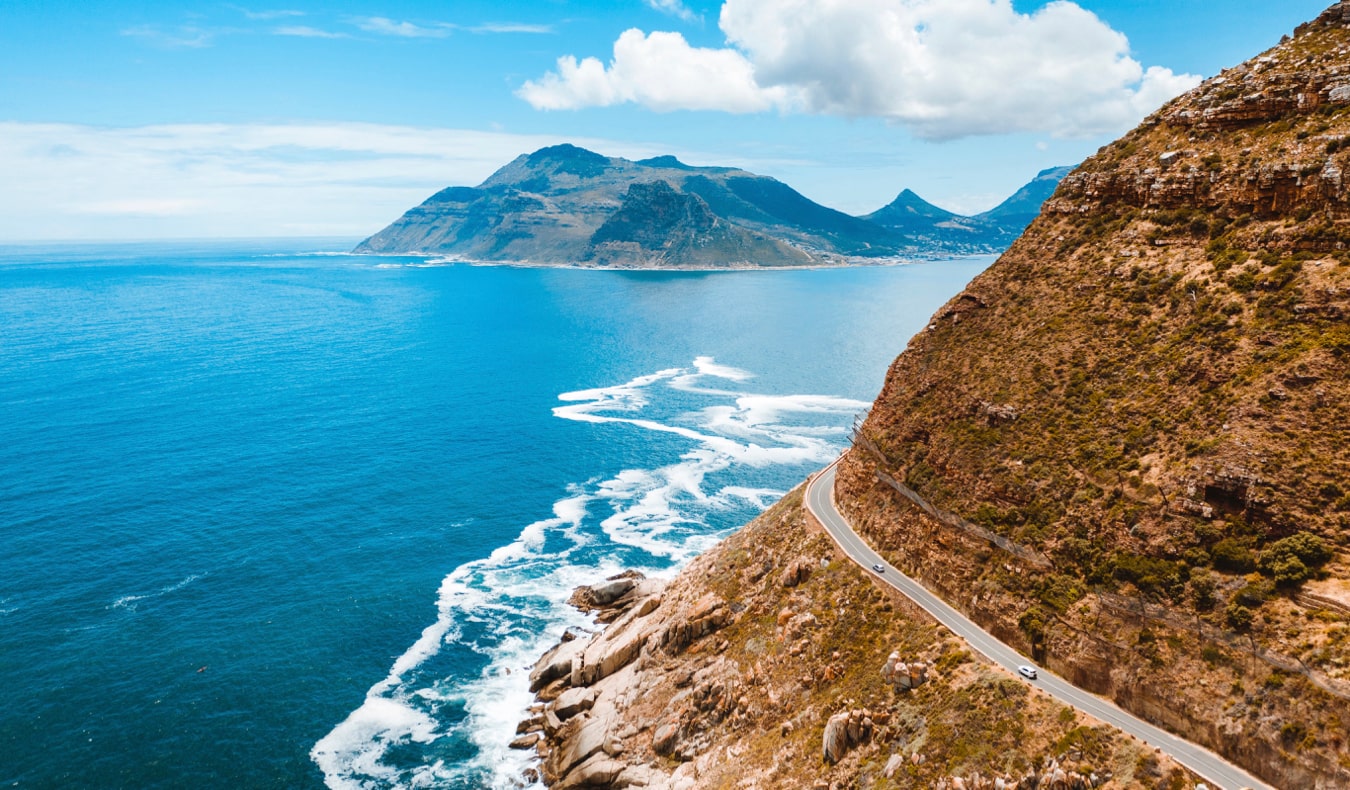
In truth, road-tripping through South Africa is not much of a problem at all, as other cars are passing by all the time should a breakdown occur, and South Africans are incredibly friendly and helpful.
That’s not to say driving in South Africa is without risk. There are carjackings from time to time, and break-ins are common. But being aware of this and taking precautions to keep valuables hidden and doors locked greatly reduces the risks.
Renting a car is the most convenient way to get around since you can get to many out-of-the-way parks, cities, and destinations. If you would rather not travel alone but still want to rent a car, post on travel forums such as:
- Africa Backpacking Facebook group
- Couchsurfing
For the best car rental prices, use Discover Cars .
Additionally, ask around hostels as there are usually people looking (or offering) rides (I found my partner in crime through a friend of mine). Not only will you get to meet new people but you’ll be able to split the gas costs, saving you money.
I rented a Volkswagen Vevo, which we booked online and picked up in person. The price worked out to be 4,350 ZAR for two weeks, including gas, the fee for dropping off in a different city than we rented in (we picked the car up in Johannesburg and dropped it off in Cape Town), and insurance.
During my trip, gas cost around 17 ZAR per liter. As of 2023, it’s closer to 23 ZAR per liter. If you choose a smaller car, mileage can be quite good. To keep costs low, we also gave rides to other backpackers we met along the way in exchange for a bit of gas money.
While it’s possible to buy a cheap car and sell it later, the paperwork can sometimes take months to go through and thus is not the best for travelers who don’t plan to spend ages in the country.
A small manual car will do for most popular destinations in South Africa. I’ll admit, a 4×4 would have been helpful for a few of the lesser-visited places that we went to during our road trip, such as the amphitheater hike in the Drakensberg mountains . But they are more expensive to rent and use more fuel. I’d only rent one if you plan on getting off the beaten path often.
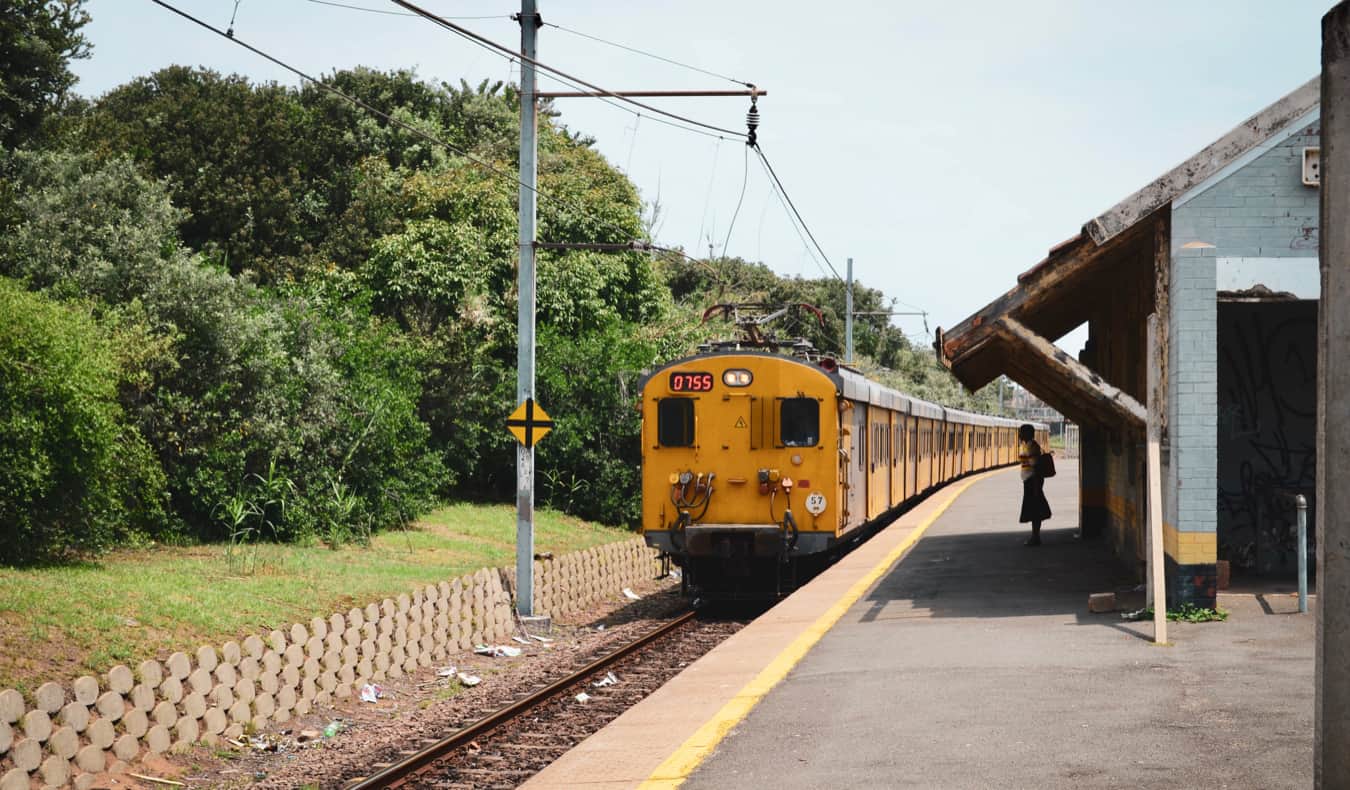
Shosholoza Meyl (South African Railways) has long-distance trains that serve Cape Town, Port Elizabeth, Bloemfontein, Durban, East London, Johannesburg, Queenstown, and East London. They’re comfortable and safe and make various stops at smaller towns along the way.
The fares are some of the cheapest available for any mode of transport in South Africa, running as low as 330 ZAR for a sleeper berth from Johannesburg to Durban. They’re safe, comfortable, and one of the best-kept secrets of traveling South Africa.
For those who are interested in some luxury, the famous Blue Train , which runs from Pretoria to Cape Town, costs 41,380 ZAR for a luxury double berth. The trip lasts a few days and includes wine, cigars, great food, and comfortable compartments. It’s the fanciest way to see the country!
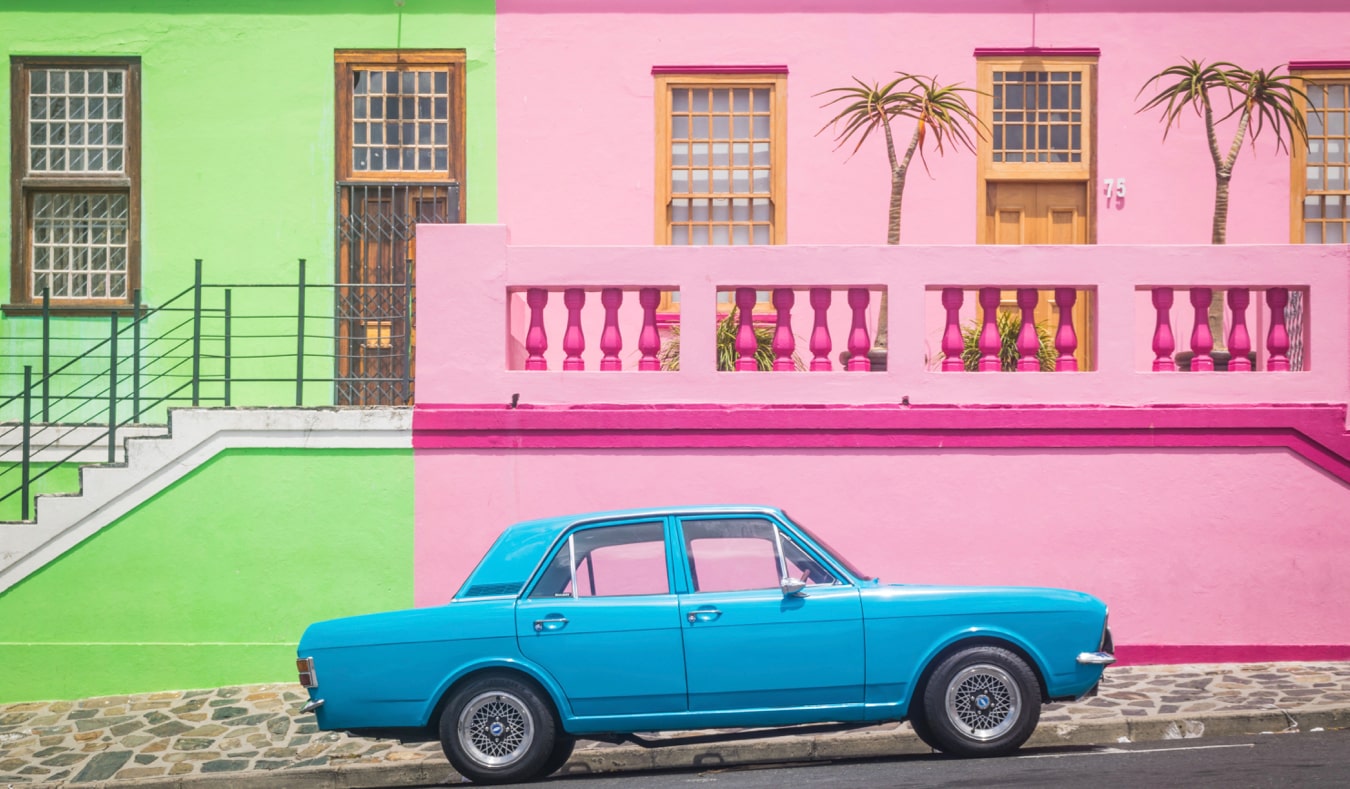
That said, muggings are still common, especially amongst tourists and particularly in Cape Town and Johannesburg. Given the high level of rape and theft in South Africa, I wouldn’t advise hitchhiking ( which is something I usually love to do! ).
Additionally, one shouldn’t walk around alone at night, be flashy, or leave things showing in the car, but much of that is true around the world.
For more safety tips, here’s a complete guide to staying safe in South Africa .
There are numerous ways to get around South Africa , and after testing several methods, I think the best is a car rental. Nothing else offers the flexibility, convenience, and reasonable price tag. If a car rental isn’t your thing and you’re solo, I’d consider the Baz Bus.
That said, regardless of which of the above transport methods you choose, South Africa is easy and relatively affordable to travel around, whether you’re solo, in a group, or a duo.
Kristin Addis is a solo female travel expert who inspires women to travel the world in an authentic and adventurous way. A former investment banker who sold everything and left California in 2012, Kristin has solo traveled the world ever since. You can find more of her work at Be My Travel Muse or on Instagram and Facebook .
Book Your Trip to South Africa: Logistical Tips and Tricks
Book Your Flight Use Skyscanner to find a cheap flight. They are my favorite search engine because they search websites and airlines around the globe so you always know no stone is left unturned.
Book Your Accommodation You can book your hostel with Hostelworld as they have the biggest inventory and best deals. If you want to stay somewhere other than a hostel, use Booking.com as they consistently return the cheapest rates for guesthouses and cheap hotels.
Don’t Forget Travel Insurance Travel insurance will protect you against illness, injury, theft, and cancellations. It’s comprehensive protection in case anything goes wrong. I never go on a trip without it as I’ve had to use it many times in the past. My favorite companies that offer the best service and value are:
- Safety Wing (for everyone below 70)
- Insure My Trip (for those over 70)
- Medjet (for additional evacuation coverage)
Looking for the Best Companies to Save Money With? Check out my resource page for the best companies to use when you travel. I list all the ones I use to save money when I’m on the road. They will save you money when you travel too.
Want More Information on South Africa? Be sure to visit our robust destination guide to South Africa for even more planning tips!
Got a comment on this article? Join the conversation on Facebook , Instagram , or Twitter and share your thoughts!
Disclosure: Please note that some of the links above may be affiliate links, and at no additional cost to you, I earn a commission if you make a purchase. I recommend only products and companies I use and the income goes to keeping the site community supported and ad free.
Related Posts

Get my best stuff sent straight to you!
Pin it on pinterest.

South Africa Travel Blog
Your Options to Travel by Bus from Johannesburg to Durban
Bus travel is one of the most cost-effective ways to travel between two destinations. This is also true when travelling between Johannesburg and Durban in South Africa’s KwaZulu-Natal Province . Furthermore, travelling by bus between these two cities allows you to see beautiful South African landscapes while sitting back and relaxing. If you want to travel from Johannesburg to Durban, or vice versa, in an affordable way, here are your options for taking the bus from Johannesburg to Durban.
Take a direct flight instead for the fastest way to get from Johannesburg to Durban. Click here to see the best deals on plane tickets ! You may prefer to hire a car to drive from Johannesburg to Durban; we only use RentalCars.com ! You can also take a nice road trip by driving from Johannesburg to Durban .
General Information on Travelling by Bus from Johannesburg to Durban
There are several bus operators offering routes from Johannesburg to Durban. These companies include InterCape, Greyhound South Africa, Eagle Liner, Eldo Coaches, Intercity Xpress, Vilamora, African Passenger Motors, Luciano Luxury Coaches and Nozulu. This post considers the options to travel by bus from Johannesburg to Durban.
There are about 53 buses daily from Johannesburg to Durban, with the earliest bus leaving at 7:30 and the latest at 23:00 (11 PM). The average bus ticket costs R392, with the cheapest bus tickets costing R253.

The most popular bus stations in Johannesburg are the Park City Transfer City, South Gate Shopping Centre, OR Tambo International Airport and Bethrams. The different operators pick passengers up and drop them off at specific stations, so check the pick-up and drop-off points before you book your bus ticket. In Durban, the most popular stations are Beach Station, Jacobs Station and Durban Bus Station.
If you like bus travel, why not take the bus from Johannesburg to Cape Town ? You can also explore the train options from Johannesburg to Cape Town or take the ultimate road trip by driving from Johannesburg to Cape Town , or the other way around.
The Johannesburg to Durban Bus Route
Johannesburg and Durban are two of the largest cities in South Africa . The direct road distance between them is 570 kilometres. The bus operators have different routes for getting you from Johannesburg to Durban. The direct route is the quickest way from Johannesburg to Durban and travels via Harrismith . Some bus operators offer other bus routes from Johannesburg to Durban via Kimberley , Virginia , Newcastle , Vryheid , Richards Bay or Ladysmith .
Learn about Durban’s weather and what to wear when you visit this city.

How Many Hours Does It Take to Travel by Bus from Johannesburg to Durban?
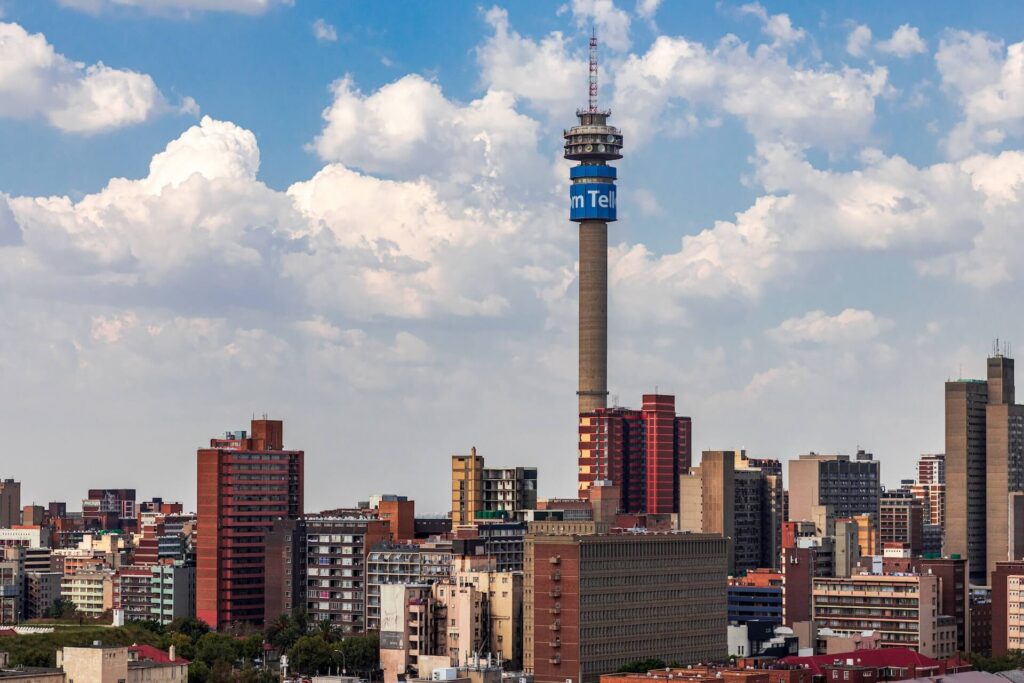
The duration of a trip from Johannesburg to Durban depends on the route chosen. The traffic in larger cities may affect departure and arrival times. The shortest travel time by bus from Johannesburg to Durban is 6 hours and 45 minutes, while the average duration of this trip is 10 hours and 15 minutes. Several bus operators offer the shortest route from Johannesburg to Durban, taking 6 hours and 45 minutes. The longest bus route from Johannesburg to Durban is 10 hours and 15 minutes, offered by African Passenger Motors.
If you are in Johannesburg, find out why you should visit the Johannesburg Zoo , the Elephant Sanctuary , the Montecasino Bird Gardens and Croc City . The Harties Cable Car experience is fun, and Sun City is another wonderful destination for families!
Bus from Johannesburg to Durban: Bus Tickets and Prices
The bus companies offer different prices for the bus routes from Johannesburg to Durban. The table below estimates the bus price – always remember that peak times will have higher ticket prices. For information on peak times, read about the South African holidays .
The best time to book your Durban bus tickets is 30 days before your departure date. The prices below are for a random date selected (9 May 2023) for a one-way ticket. Similar to flights, return trips are usually cheaper than two one-way tickets. To find the best price for a bus ticket from Johannesburg to Durban for your preferred travel date, check the Busbud website .
Here is a comparison of the bus ticket prices on Busbud for a random date (9 May 2023):
Where to Buy the Bus Tickets for Travel Between Johannesburg and Durban?
All these bus operators have websites allowing online bookings. You can also buy tickets from them using an aggregator site like Busbud . Using an aggregator site helps you compare the trip durations and prices of the bus operators.

You can also purchase bus tickets online from Computicket for some bus operators. Generally, you must fetch the physical ticket from a Computicket office. Furthermore, you can buy some regular bus tickets at specific supermarkets such as Checkers/Shoprite and Spar. Be careful when buying tickets by choosing the bus operator with the route and pick-up and drop-off points you prefer.
Your Options to Travel by Bus from Johannesburg to Durban: Bus Tickets
The bus companies differ in terms of the number of trips each offers daily, as can be seen from the table below based on 9 May 2023 on Busbud :
Durban to Johannesburg Bus Tickets and Prices
The same bus operators offer bus trips from Durban to Johannesburg at different prices. The table below gives estimates of the bus prices. Remember that ticket prices may be higher during peak times of the year. Here is a comparison of the bus ticket prices on Busbud for a random date (9 May 2023):
Options for Bus Tickets from Durban to Johannesburg
The different bus operators offer trips at different times of the day. The table below summarises the number of trips each bus operator provides from Durban to Johannesburg for 9 May 2023 on Busbud :
What You Should Consider When Booking Your Bus Ticket from Johannesburg to Durban
These are some considerations for bus travel from Johannesburg to Durban:
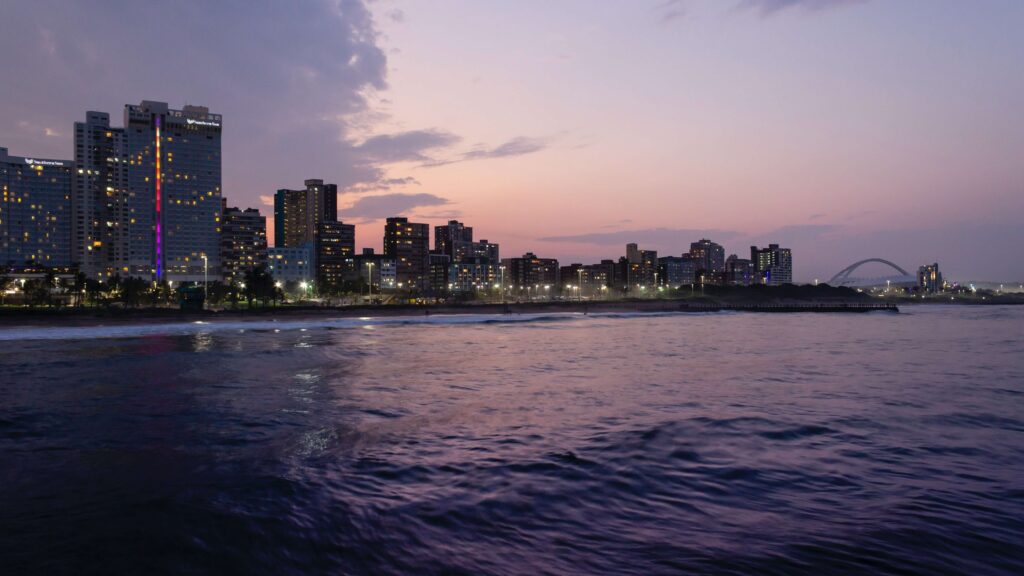
The Bus Schedules of The Bus Operators
Consider the operator’s bus schedules to determine the best time for your trip. Compare their departure times, trip duration and prices to choose the operator to travel with. Looking at the impact on price if you book a return trip is always a good idea.
Consider Each Bus Operator’s Ticket Options
Each bus company offers differentiated ticket options. Not all bus operators have websites with information on their ticket options and routes. Those that do are:
InterCity and Eagle Liners
These two bus operators have the same ticket options. All tickets include air conditioning, charging ports and on-board entertainment. The main differences between the ticket options are:
- Charter: The seats in this class cannot recline, but you have on-board toilet facilities.
- Economy: This economy class offers semi-reclining seats but no on-board toilet facilities.
- Luxury: The luxury tickets have reclining seats and on-board toilets.
There are fewer charter and luxury seats available than economy tickets. If you book in advance, you will have more flexibility about the ticket options available.
Eldo Coaches
This bus operator does not offer different classes of tickets. Eldo Coaches travel from Johannesburg to Durban via Harrismith and Pietermaritzburg.
Intercape does not offer different classes of tickets, but they have tickets offering different levels of flexibility. You can choose from booking one of the following tickets:
- Saver: You can cancel your ticket up to 48 hours before departure with a refund minus the 25% cancellation fee. There are no discounts or seat reservations possible with the saver ticket. The same terms apply to rebookings.
- Flexi: You can cancel your ticket up to 24 hours before departure and receive a refund minus a 15% cancellation fee. The same terms apply to rebookings. You can obtain discounts and reserve seats on select routes with a flexi ticket.
- Full-flexi: You can cancel up to 12 hours before departure and receive a refund minus a 10% cancellation fee. You can obtain discounts and reserve seats on select routes with a full-flexi ticket. The same terms apply to rebookings.
They have the most extensive range of routes when busing from Johannesburg to Durban. They travel from Johannesburg to Durban via Ladysmith, Kimberley and Virginia.
Greyhound South Africa
Greyhound South Africa does not offer different ticket classes. They have various routes from Johannesburg to Durban via Newcastle, Vryheid or Richards Bay.
Vilamora Tours
Vilamore does not have different ticket classes.
How Safe Is Bus Travel in South Africa?
Watching your luggage when luggage is loaded or offloaded would be best. Leaving your luggage unattended is an invitation to thieves. Some buses from Johannesburg to Durban travel overnight. Be more careful at night and ensure your valuables are protected. The best seat for safety is near the front of the bus.
If you prefer flying, take a look at how to choose the best airport for your South Africa travels . We also have guides on the King Shaka International Airport , Lanseria Airport and Johannesburg International Airport .
The Bus Routes Are Fixed
The bus operators follow fixed routes. Although the bus operators have different routes between Johannesburg and Durban, the stops are pre-determined, and you cannot ask the bus driver to detour from the set route.
Your Transport Options to And from The Bus Departure and Arrival Points

While planning your trip, make sure where the bus route departs from and stops and what your transport options to your final destination are from here. Most of the bus operators stop at different stations in Johannesburg and Durban. You can use Uber, taxis or other hailing services in Johannesburg and Durban.
Don’t miss visiting the uShaka Marine World in Durban!
Take Your Favourite Snacks and Drinks With
Although the buses stop for breaks, these are short and may give you little time to purchase drinks or snacks if you need a bathroom break.
Once you’re in Durban, explore all the attractions of this beautiful province .

Editor of the South Africa Travel Blog that focuses on travel to South Africa, including destinations, attractions, accommodation, food & drink.
Leave a comment Cancel reply
Your email address will not be published. Required fields are marked *
Save my name, email, and website in this browser for the next time I comment.
Privacy Overview
- Skip to main content
- Skip to "About this site"
Language selection
Search travel.gc.ca.
Help us to improve our website. Take our survey !
COVID-19: travel health notice for all travellers
South Africa travel advice
Latest updates: Health – editorial update
Last updated: March 13, 2024 14:10 ET
On this page
Safety and security, entry and exit requirements, laws and culture, natural disasters and climate, south africa - exercise a high degree of caution.
Exercise a high degree of caution in South Africa due to the significant level of serious crime.
Back to top
Nationwide power shortages or rolling blackouts, referred to as load shedding, are still occurring regularly. They are occurring numerous times a day and for multiple-hour stretches. They are expected to continue through 2023 and into 2024.
Though the potential for a nationwide blackout is low, the associated risks are high, including a nationwide loss of power for days or weeks.
South Africa has already experienced blackouts for up to 12 hours in a 24 hour period. Increased demand for power during the coldest winter months of June and July means that blackouts could last longer. Expect a dark and cold winter.
An official schedule of the planned blackouts provides advance notice of the shortages. However, they can also occur with very little notice.
Blackouts could increase the risk of criminal activity in affected areas, which could in turn lead to opportunistic theft and prolonged outages.
Blackouts can affect the following services and businesses:
- telecommunications and security systems
- stores and food supply
- hotels and other accommodations
- banks and ATMs
- gas stations
- public lighting and traffic lights
Interruptions to water supply occur occasionally and can be lengthy in some areas, causing considerable inconvenience.
If you’re in South Africa:
- be prepared for extended power outages
- make sure you always have a complete emergency kit on hand, including several flashlights
- always carry a cell phone, power banks, chargers and a list of emergency numbers handy
- keep a sufficient supply of water, food, medication and fuel on hand for several days
- keep your travel documents up-to-date
- monitor local media
- follow the instructions of local authorities
Useful links
- List of planned blackouts - Eskom, South African electricity public utility
- Get Prepared - basic emergency kit
Violent crime
South Africa has a very high level of crime. Crime is the primary security threat to travellers.
Violent crimes, including rape and murder, occur frequently and have involved foreigners.
Muggings, armed assaults and theft are also frequent, often occurring in areas that are popular among tourists. Carjackings, robbery and assault also occur.
Armed robberies at shopping malls occur. To minimize the risk of personal assault if confronted by an armed individual:
- immediately comply
- avoid making sudden movements
- avoid resisting or antagonizing the assailants
- avoid eye contact with your assailant
Crime significantly increases after dark in major city centres and townships. After dark, avoid the areas of:
- Hillbrow and Yeoville in Johannesburg
- Sunnyside in Pretoria
- the beachfront and Victoria wharf in Durban
- Cape Town downtown hotels to the waterfront
Crimes of opportunity
There is a high risk of pickpocketing. You should not carry your wallet in your back pocket.
Do not show signs of affluence, display money or carry valuables such as laptop computers or cameras.
When at restaurants or bars, do not leave your bag under your chair or table or hung over the back of a chair; keep it on your lap.
Ensure that all your bags’ zippers, straps and fasteners are closed and secure, and be aware of people behind and around you.
Criminals are known to target people who appear distracted and are not paying attention to their immediate surroundings.
If you believe that you are being followed, go directly to a police station.
Crime in and around airports
Passengers have been followed upon arrival at airports and then robbed either on their way to or once they arrived at their final destination. There are also reports of theft from checked luggage.
Some areas around Cape Town International Airport are less secure. There are reports of an increased risk of attack on secondary roads near the airport.
When travelling to and from an airport:
- stay on highways and main roads
- avoid shortcuts
- if you are using a GPS, make sure that the itinerary avoid townships and secondary roads
- plan your trip in advance and verify your travel itinerary with a trusted local source
- consider arranging an airport transfer
On the road
Be vigilant at vulnerable points such as:
- traffic lights
- yield signs
- highway off-ramps
Smash and grab incidents are frequent. This is when car windows are broken and valuables such as handbags are taken while cars are waiting at junctions.
- Park in well-lit areas
- Do not pick up strangers
- Ensure that vehicle doors are locked and windows are closed at all times
Hotel theft
Theft from hotel rooms and guest houses is common. Never leave your windows or doors open or unlocked, even when you are present.
- Check the level of security at guest houses, hotels, lodges, backpacker lodges or any accommodation before making bookings
- Don’t leave luggage and valuables unattended; place them in safekeeping facilities
- Don’t open the door to anyone without taking necessary precautions. If someone claims to be a member of staff, verify with the reception prior to opening the door
Police officer impersonation
Criminals may pose as police officers to extort or rob tourists. There are reports that criminals use fake IDs and flashing blue lights to stop cars with the intent to rob the passengers or steal the vehicle.
If you face this situation:
- do not stop your vehicle
- put on your hazard lights and continue to the nearest police station or secure location
There is a threat of kidnapping across South Africa. Foreign nationals have been kidnapped in the past. Kidnappings are generally for financial gain or motivated by criminality.
Scammers could kidnap you to extort money from your loved ones in exchange for your release.
- Be wary of online romance, employment and money scams
- Never accept an invitation to travel to an unfamiliar location
- If you think you've been scammed, do not travel overseas to get your money back
Demonstrations
Demonstrations can occur anywhere across the country and sometimes on short notice. Even peaceful demonstrations can turn violent at any time. They can also lead to disruptions to traffic and public transportation.
- Avoid areas where demonstrations and large gatherings are taking place
- Follow the instructions of local authorities
- Monitor local media for information on ongoing demonstrations
Mass gatherings (large-scale events)
Cases of attempted fraud are frequently reported in South Africa. Do not give personal or financial account information to anyone.
Don’t attempt to use ATMs that appear damaged or defective, or are in isolated or poorly lit areas. Don’t accept any offer of assistance with your transaction. If suspicious at any time, cancel your transaction and use another ATM.
- Pay careful attention when your cards are being handled by others
- Use ATMs located in well-lit public areas or inside a bank or business
- Avoid using card readers with an irregular or unusual feature
- Cover the keypad with one hand when entering your PIN
- Check for any unauthorized transactions on your account statements
Overseas fraud
Reserves and hiking trails
There have been attacks on hikers and tourists at reserves, hiking trails, including Table Mountain, Lions’ Head, Signal Hill and other tourist attractions and their parking lots.
Avoid the Numbi Gate entrance to the Kruger National Park, as well as the R538 road leading to it due to an increase in criminal activity in the area, including the murder of a foreign national in October 2022.
- Hike in groups and take all appropriate precautions
- Avoid isolated picnic areas and beaches
- Don’t stop at deserted roadside resting places on national roads
Spiked food and drink
There have been incidents of food or drink being drugged and tourists robbed when unconscious.
Never leave food or drinks unattended or in the care of strangers. Be wary of accepting snacks, beverages, gum or cigarettes from new acquaintances. These items may contain drugs that could put you at risk of sexual assault and robbery.
There is a threat of terrorism. Terrorist attacks could occur at any time. Individuals who may be inspired by terrorist groups may carry out “lone actor” attacks targeting public places, including where foreigners gather.
Targets could include:
- government buildings, including schools
- places of worship
- airports and other transportation hubs and networks
- public areas such as tourist attractions, restaurants, bars, coffee shops, shopping centres, markets, hotels and other sites frequented by foreigners
South African authorities have successfully disrupted planned attacks and made arrests related to terrorism offences. Always be aware of your surroundings when in public places.
Regional unrest
Xenophobic attacks, primarily targeting refugees or immigrants from other African nations, related demonstrations, looting and outbreaks of violence occur. This type of unrest could occur in any region of the country and with little warning.
Avoid large gatherings and demonstrations, monitor local media and follow the instructions of local authorities at all times.
Townships and rural areas
Avoid townships and informal settlements if you are unfamiliar with them, except when travelling with organized tours provided by a reputable company or in association with an experienced local organization.
Wildlife viewing
Wildlife viewing poses risks, particularly on foot or at close range. Be aware of the threat of monkeys and baboons overwhelming sightseers in their search for food. They are known to get very aggressive.
- Always maintain a safe distance when observing wildlife
- Only exit a vehicle when a professional guide or warden says it’s safe to do so
- Only use reputable and professional guides or tour operators
- Closely follow park regulations and wardens’ advice
Water activities
Coastal waters have unpredictable wave and currents patterns, which can be dangerous. Shark attacks have been reported in several areas, including in KwaZulu-Natal and Western Cape.
- Follow the advice and warnings of local authorities
- Be cautious when swimming in lakes and rivers because of the risk posed by wildlife
Water safety abroad
Telecommunications
Cellular phone reception is generally good in major towns and cities but can be intermittent in rural areas. Extended periods of rolling blackouts are impacting internet connectivity and cell phone networks.
Always carry a cellular phone in the event of an emergency. If using your own phone, ensure that it has international/roaming capability for use while in South Africa.
Road safety
Fatal road accidents are common in South Africa. Accidents occur especially in wet conditions, as roads can be very slippery. Traffic lights are frequently out of order. GPS navigation systems may suggest the most direct route but not the safest.
- Observe the recommended following distances
- Avoid undertaking overland travel after dark
- Treat all intersections with malfunctioning traffic lights as a four-way stop
- Verify your travel itinerary with a trusted local source, such as your hotel, your travel agent or local police, before driving
Road conditions
Driving can be dangerous due to:
- insufficient lighting
- pedestrians crossing major highways
- wild animals and stray livestock on the road
Driving habits
Drivers do not always respect traffic laws, especially at night. Drivers often drive at excess speed and ignore traffic signs. Drinking and driving is common.
Drivers are often aggressive toward pedestrians and fail to yield the right of way even on marked crosswalks.
Travel on foot is inadvisable in most areas. If walking is unavoidable, use only brightly lit, busy streets in popular tourist areas and maintain awareness of your surroundings.
If you choose to drive in South Africa:
- always drive defensively
- plan your trip in advance, especially if you are visiting a rural area
- avoid travelling after dark
- choose a vehicle with a robust central locking system, lockable fuel tank cap and vehicle alarm
- use a reliable rental company offering 24-hour emergency service and ensure that you have the contact details for the service
Public transportation
Avoid using public transportation.
Tourists have been mugged and assaulted in and around bus stations. Avoid the central bus station in Johannesburg.
Train services are slow and several serious accidents in recent years have raised concerns over safety standards.
Violent attacks have occurred on commuter and metro trains between Johannesburg and Pretoria, as well as on commuter trains in Cape Town. Don’t travel by train, especially second or third class.
The Gautrain between O.R. Tambo International Airport in Johannesburg and Pretoria, as well as the Blue Train and Rovos Rail, are, however, safe for tourists.
Taxis cannot be hailed in the street. Ask your hotel to arrange a taxi and ensure that you prearrange transport for your return journey.
Sit in the rear of the vehicle and keep windows up and doors locked at all times. Keep valuables out of sight and place bags by your feet. Negotiate the fare with the driver in advance. Avoid using minibuses and unlicensed taxis.
We do not make assessments on the compliance of foreign domestic airlines with international safety standards.
Information about foreign domestic airlines
Every country or territory decides who can enter or exit through its borders. The Government of Canada cannot intervene on your behalf if you do not meet your destination’s entry or exit requirements.
We have obtained the information on this page from South African authorities. It can, however, change at any time.
Verify this information with the Foreign Representatives in Canada .
Entry requirements vary depending on the type of passport you use for travel.
Before you travel, check with your transportation company about passport requirements. Its rules on passport validity may be more stringent than the country’s entry rules.
Regular Canadian passport
You may also be denied boarding at the point of departure if you don’t have enough blank pages for the visa. If you plan to visit neighbouring countries and return to South Africa, ensure that there are sufficient visa pages in your passport for those countries’ visas and those of South Africa.
Passport for official travel
Different entry rules may apply.
Official travel
Passport with “X” gender identifier
While the Government of Canada issues passports with an “X” gender identifier, it cannot guarantee your entry or transit through other countries. You might face entry restrictions in countries that do not recognize the “X” gender identifier. Before you leave, check with the closest foreign representative for your destination.
Other travel documents
Different entry rules may apply when travelling with a temporary passport or an emergency travel document. Before you leave, check with the closest foreign representative for your destination.
- Foreign Representatives in Canada
- Canadian passports
Tourist visa: not required for stays up to 90 days Business visa: not required for stays up to 90 days Student permit: required Employment permit: required
Canadians don't need a tourist visa to enter South Africa. However, upon arrival, immigration officials will issue a temporary residents visa (TRV) for up to 90 days. Check the expiry date of your TRV to ensure you don’t overstay.
If you overstay without authority, you may be forced to pay a fine upon departure and/or can be refused entry for up to 5 years.
Serious offenders may be arrested before departure and detained until their court appearance. In such cases, visitors may face a very substantial fine and be deported at their own expense.
South African visas - South African Department of Home Affairs
Changing or extending your visa
Some foreigners travelling to South Africa have not gone through the correct channels to obtain, change or extend their relevant visas. This has resulted in arrest and detention due to fraudulently issued visas.
While in South Africa, you must go through regional or district offices of the South African Department of Home Affairs for information on visa requirements and issuance.
Regional travel
If you leave and re-enter South Africa, even for a short time, you will not automatically be given an additional 90-day visitor’s visa. An immigration official can deny you re-entry into South Africa. The immigration officer can also allow you to enter for a limited time only.
If you wish to extend your stay, contact the South African Department of Home Affairs 60 days before your visitor’s visa expires.
South African Department of Home Affairs contact information
Work or study
If you intend to work or study in South Africa, you must apply for the relevant visas prior to your arrival; otherwise, you risk being refused entry and may be returned to your point of origin. You cannot change the type of visa once in South Africa.
Other entry requirements
You must be in possession of a return or an onward ticket. Without one, you may be required to deposit the equivalent of a fare home with customs. The money will be refunded after departure from South Africa.
Residence permit
If you reside in South Africa, you must have valid residence permit in your passport each time you enter and leave the country.
Dual citizenship
Dual citizens must enter or depart South Africa using their South African passport only.
For further information on dual citizenship, contact the High Commission for the Republic of South Africa in Ottawa.
Children and travel
Minors traveling to and from South Africa must have a valid passport and may be subject to additional requirements.
You must produce a long form birth certificate when travelling with children under the age of 18 to neighbouring countries. The long form birth certificate must be in English or translated into English.
Contact the nearest South African mission abroad or visit the South African Department of Home Affairs website, before travelling, to verify the latest requirements.
- Entry regulations when travelling with children - South African Department of Home Affairs
- Travelling with children
Yellow fever
Learn about potential entry requirements related to yellow fever (vaccines section).
Relevant Travel Health Notices
- Global Measles Notice - 13 March, 2024
- COVID-19 and International Travel - 13 March, 2024
This section contains information on possible health risks and restrictions regularly found or ongoing in the destination. Follow this advice to lower your risk of becoming ill while travelling. Not all risks are listed below.
Consult a health care professional or visit a travel health clinic preferably 6 weeks before you travel to get personalized health advice and recommendations.
Routine vaccines
Be sure that your routine vaccinations , as per your province or territory , are up-to-date before travelling, regardless of your destination.
Some of these vaccinations include measles-mumps-rubella (MMR), diphtheria, tetanus, pertussis, polio, varicella (chickenpox), influenza and others.
Pre-travel vaccines and medications
You may be at risk for preventable diseases while travelling in this destination. Talk to a travel health professional about which medications or vaccines may be right for you, based on your destination and itinerary.
Yellow fever is a disease caused by a flavivirus from the bite of an infected mosquito.
Travellers get vaccinated either because it is required to enter a country or because it is recommended for their protection.
- There is no risk of yellow fever in this country.
Country Entry Requirement*
- Proof of vaccination is required if you are coming from or have transited through an airport of a country where yellow fever occurs.
Recommendation
- Vaccination is not recommended.
- Discuss travel plans, activities, and destinations with a health care professional.
- Contact a designated Yellow Fever Vaccination Centre well in advance of your trip to arrange for vaccination.
About Yellow Fever
Yellow Fever Vaccination Centres in Canada * It is important to note that country entry requirements may not reflect your risk of yellow fever at your destination. It is recommended that you contact the nearest diplomatic or consular office of the destination(s) you will be visiting to verify any additional entry requirements.
There is a risk of hepatitis A in this destination. It is a disease of the liver. People can get hepatitis A if they ingest contaminated food or water, eat foods prepared by an infectious person, or if they have close physical contact (such as oral-anal sex) with an infectious person, although casual contact among people does not spread the virus.
Practise safe food and water precautions and wash your hands often. Vaccination is recommended for all travellers to areas where hepatitis A is present.
Measles is a highly contagious viral disease. It can spread quickly from person to person by direct contact and through droplets in the air.
Anyone who is not protected against measles is at risk of being infected with it when travelling internationally.
Regardless of where you are going, talk to a health care professional before travelling to make sure you are fully protected against measles.
Hepatitis B is a risk in every destination. It is a viral liver disease that is easily transmitted from one person to another through exposure to blood and body fluids containing the hepatitis B virus. Travellers who may be exposed to blood or other bodily fluids (e.g., through sexual contact, medical treatment, sharing needles, tattooing, acupuncture or occupational exposure) are at higher risk of getting hepatitis B.
Hepatitis B vaccination is recommended for all travellers. Prevent hepatitis B infection by practicing safe sex, only using new and sterile drug equipment, and only getting tattoos and piercings in settings that follow public health regulations and standards.
Coronavirus disease (COVID-19) is an infectious viral disease. It can spread from person to person by direct contact and through droplets in the air.
It is recommended that all eligible travellers complete a COVID-19 vaccine series along with any additional recommended doses in Canada before travelling. Evidence shows that vaccines are very effective at preventing severe illness, hospitalization and death from COVID-19. While vaccination provides better protection against serious illness, you may still be at risk of infection from the virus that causes COVID-19. Anyone who has not completed a vaccine series is at increased risk of being infected with the virus that causes COVID-19 and is at greater risk for severe disease when travelling internationally.
Before travelling, verify your destination’s COVID-19 vaccination entry/exit requirements. Regardless of where you are going, talk to a health care professional before travelling to make sure you are adequately protected against COVID-19.
The best way to protect yourself from seasonal influenza (flu) is to get vaccinated every year. Get the flu shot at least 2 weeks before travelling.
The flu occurs worldwide.
- In the Northern Hemisphere, the flu season usually runs from November to April.
- In the Southern Hemisphere, the flu season usually runs between April and October.
- In the tropics, there is flu activity year round.
The flu vaccine available in one hemisphere may only offer partial protection against the flu in the other hemisphere.
The flu virus spreads from person to person when they cough or sneeze or by touching objects and surfaces that have been contaminated with the virus. Clean your hands often and wear a mask if you have a fever or respiratory symptoms.
Malaria is a serious and sometimes fatal disease that is caused by parasites spread through the bites of mosquitoes. There is a risk of malaria in certain areas and/or during a certain time of year in this destination.
Antimalarial medication may be recommended depending on your itinerary and the time of year you are travelling. Consult a health care professional or visit a travel health clinic before travelling to discuss your options. It is recommended to do this 6 weeks before travel, however, it is still a good idea any time before leaving. Protect yourself from mosquito bites at all times: • Cover your skin and use an approved insect repellent on uncovered skin. • Exclude mosquitoes from your living area with screening and/or closed, well-sealed doors and windows. • Use insecticide-treated bed nets if mosquitoes cannot be excluded from your living area. • Wear permethrin-treated clothing. If you develop symptoms similar to malaria when you are travelling or up to a year after you return home, see a health care professional immediately. Tell them where you have been travelling or living.
In this destination, rabies is commonly carried by dogs and some wildlife, including bats. Rabies is a deadly disease that spreads to humans primarily through bites or scratches from an infected animal. While travelling, take precautions , including keeping your distance from animals (including free-roaming dogs), and closely supervising children.
If you are bitten or scratched by a dog or other animal while travelling, immediately wash the wound with soap and clean water and see a health care professional. In this destination, rabies treatment may be limited or may not be available, therefore you may need to return to Canada for treatment.
Before travel, discuss rabies vaccination with a health care professional. It may be recommended for travellers who are at high risk of exposure (e.g., occupational risk such as veterinarians and wildlife workers, children, adventure travellers and spelunkers, and others in close contact with animals).
Safe food and water precautions
Many illnesses can be caused by eating food or drinking beverages contaminated by bacteria, parasites, toxins, or viruses, or by swimming or bathing in contaminated water.
- Learn more about food and water precautions to take to avoid getting sick by visiting our eat and drink safely abroad page. Remember: Boil it, cook it, peel it, or leave it!
- Avoid getting water into your eyes, mouth or nose when swimming or participating in activities in freshwater (streams, canals, lakes), particularly after flooding or heavy rain. Water may look clean but could still be polluted or contaminated.
- Avoid inhaling or swallowing water while bathing, showering, or swimming in pools or hot tubs.
Travellers' diarrhea is the most common illness affecting travellers. It is spread from eating or drinking contaminated food or water.
Risk of developing travellers' diarrhea increases when travelling in regions with poor standards of hygiene and sanitation. Practise safe food and water precautions.
The most important treatment for travellers' diarrhea is rehydration (drinking lots of fluids). Carry oral rehydration salts when travelling.
Typhoid is a bacterial infection spread by contaminated food or water. Risk is higher among children, travellers going to rural areas, travellers visiting friends and relatives or those travelling for a long period of time.
Travellers visiting regions with a risk of typhoid, especially those exposed to places with poor sanitation, should speak to a health care professional about vaccination.
There is a risk of schistosomiasis in this destination. Schistosomiasis is a parasitic disease caused by tiny worms (blood flukes) which can be found in freshwater (lakes, rivers, ponds, and wetlands). The worms can break the skin, and their eggs can cause stomach pain, diarrhea, flu-like symptoms, or urinary problems. Schistosomiasis mostly affects underdeveloped and r ural communities, particularly agricultural and fishing communities.
Most travellers are at low risk. Travellers should avoid contact with untreated freshwater such as lakes, rivers, and ponds (e.g., swimming, bathing, wading, ingesting). There is no vaccine or medication available to prevent infection.
Insect bite prevention
Many diseases are spread by the bites of infected insects such as mosquitoes, ticks, fleas or flies. When travelling to areas where infected insects may be present:
- Use insect repellent (bug spray) on exposed skin
- Cover up with light-coloured, loose clothes made of tightly woven materials such as nylon or polyester
- Minimize exposure to insects
- Use mosquito netting when sleeping outdoors or in buildings that are not fully enclosed
To learn more about how you can reduce your risk of infection and disease caused by bites, both at home and abroad, visit our insect bite prevention page.
Find out what types of insects are present where you’re travelling, when they’re most active, and the symptoms of the diseases they spread.
There is a risk of chikungunya in this country. The risk may vary between regions of a country. Chikungunya is a virus spread through the bite of an infected mosquito. Chikungunya can cause a viral disease that typically causes fever and pain in the joints. In some cases, the joint pain can be severe and last for months or years.
Protect yourself from mosquito bites at all times. There is no vaccine available for chikungunya.
Crimean-Congo haemorrhagic fever is a viral disease that can cause fever, pain and bleeding under the skin. In some cases, it can be fatal. It spreads to humans through contact with infected animal blood or tissues, or from the bite of an infected tick. Risk is generally low for most travellers. Protect yourself from tick bites and avoid animals, particularly livestock. There is no vaccine available for Crimean-Congo haemorrhagic fever.
Rift Valley fever is a viral disease that can cause severe flu-like symptoms. In some cases, it can be fatal. It is spread to humans through contact with infected animal blood or tissues, from the bite of an infected mosquito, or eating or drinking unpasteurized dairy. Risk is generally low for most travellers. Protect yourself from insect bites and avoid animals, particularly livestock, and unpasteurized dairy. There is no vaccine available for Rift Valley fever.
Animal precautions
Some infections, such as rabies and influenza, can be shared between humans and animals. Certain types of activities may increase your chance of contact with animals, such as travelling in rural or forested areas, camping, hiking, and visiting wet markets (places where live animals are slaughtered and sold) or caves.
Travellers are cautioned to avoid contact with animals, including dogs, livestock (pigs, cows), monkeys, snakes, rodents, birds, and bats, and to avoid eating undercooked wild game.
Closely supervise children, as they are more likely to come in contact with animals.
Person-to-person infections
Stay home if you’re sick and practise proper cough and sneeze etiquette , which includes coughing or sneezing into a tissue or the bend of your arm, not your hand. Reduce your risk of colds, the flu and other illnesses by:
- washing your hands often
- avoiding or limiting the amount of time spent in closed spaces, crowded places, or at large-scale events (concerts, sporting events, rallies)
- avoiding close physical contact with people who may be showing symptoms of illness
Sexually transmitted infections (STIs) , HIV , and mpox are spread through blood and bodily fluids; use condoms, practise safe sex, and limit your number of sexual partners. Check with your local public health authority pre-travel to determine your eligibility for mpox vaccine.
Tuberculosis is an infection caused by bacteria and usually affects the lungs.
For most travellers the risk of tuberculosis is low.
Travellers who may be at high risk while travelling in regions with risk of tuberculosis should discuss pre- and post-travel options with a health care professional.
High-risk travellers include those visiting or working in prisons, refugee camps, homeless shelters, or hospitals, or travellers visiting friends and relatives.
HIV (Human Immunodeficiency Virus) is a virus that attacks and impairs the immune system, resulting in a chronic, progressive illness known as AIDS (Acquired Immunodeficiency Syndrome).
High risk activities include anything which puts you in contact with blood or body fluids, such as unprotected sex and exposure to unsterilized needles for medications or other substances (for example, steroids and drugs), tattooing, body-piercing or acupuncture.
Medical services and facilities
Medical facilities and supplies are widely available in large cities but can be expensive. Medical facilities are limited in remote areas.
Public and private health facilities require an up-front cash deposit for services, guarantee of payment or confirmation of medical insurance before commencing treatment.
Air evacuation may be the only option when faced with a medical emergency in remote areas.
Decompression chambers are available in many hospitals.
Make sure you get travel insurance that includes coverage for medical evacuation and hospital stays.
Travel health and safety
Keep in Mind...
The decision to travel is the sole responsibility of the traveller. The traveller is also responsible for his or her own personal safety.
Be prepared. Do not expect medical services to be the same as in Canada. Pack a travel health kit , especially if you will be travelling away from major city centres.
You must abide by local laws.
Learn about what you should do and how we can help if you are arrested or detained abroad .
Penalties for using, importing or exporting drugs are severe and may include lengthy imprisonment.
Drugs, alcohol and travel
You may not import or take in-transit any firearm or ammunition without a temporary export and import or in-transit permit issued by the South African Police Service.
Dual citizenship is legally recognized in South Africa.
If you are a Canadian citizen, but also a citizen of South Africa, our ability to offer you consular services may be limited while you're there. You may also be subject to different entry/exit requirements .
Travellers with dual citizenship
International Child Abduction
The Hague Convention on the Civil Aspects of International Child Abduction is an international treaty. It can help parents with the return of children who have been removed to or retained in certain countries in violation of custody rights. The convention applies between Canada and South Africa.
If your child was wrongfully taken to, or is being held in South Africa, and if the applicable conditions are met, you may apply for the return of your child to the South African court.
If you are in this situation:
- act as quickly as you can
- contact the Central Authority for your province or territory of residence for information on starting an application under The Hague Convention
- consult a lawyer in Canada and in South Africa to explore all the legal options for the return of your child
- report the situation to the nearest Canadian government office abroad or to the Vulnerable Children’s Consular Unit at Global Affairs Canada by calling the Emergency Watch and Response Centre
If your child was removed from a country other than Canada, consult a lawyer to determine if The Hague Convention applies.
Be aware that Canadian consular officials cannot interfere in private legal matters or in another country’s judicial affairs.
- List of Canadian Central Authorities for the Hague Convention
- International Child Abduction: A Guidebook for Left-Behind Parents
- The Hague Convention - Hague Conference on Private International Law
- Canadian embassies and consulates by destination
- Emergency Watch and Response Centre
Traffic drives on the left.
You may use your valid Canadian provincial driver’s licence in South Africa, however, an international driving permit (IDP) is strongly recommended.
It is extremely difficult to obtain car insurance for car rentals or to purchase a car without an IDP. Insurance companies and rental car agencies often require proof of a South African driver’s licence or an IDP to honour an insurance claim, even when such proof was not requested at the time the policy was secured. An IDP must be obtained in Canada before travelling to South Africa, as it cannot be obtained locally.
If your licence is in French, it is advisable to obtain a translation into English and carry it with you.
Foreigners driving a rental car across any border into neighbouring countries must obtain a permit from the Cross-border Road Transport Agency prior to arriving at the border crossing. Failure to do so may lead to arrest and/or a fine.
It is illegal to carry gasoline in portable containers.
- Obtain a permit - Cross-border Road Transport Agency
- International Driving Permit
The currency is the South African rand (ZAR).
Canadian currency can be easily exchanged at major banks and foreign exchange counters. A passport and additional identification is required when undertaking foreign exchange transactions.
Foreigners are permitted to enter South Africa carrying a maximum of ZAR100,000, or US$10,000 or its equivalent in foreign currencies. Customs forms are not required to be completed, but random customs checks are conducted.
Rain Storms
The climate varies from region to region. Storms and flooding can occur throughout the country and at various times of the year. Flash storms can occur in Gauteng and North West provinces from November to April. There are heavy rains along the south coast from June to September and the Western Cape receives heavy rainfall between May and September. Dirt roads can become hazardous during these periods. After heavy rains, do not attempt to cross low-lying river bridges by car or on foot, as there have been fatalities linked to people being washed down river. Keep informed of regional weather forecasts and plan accordingly.
Veld (bush) fires are common during dry seasons. They are very unpredictable and extremely dangerous. They can spread very quickly and travel at speeds of 60 km/h or more, due to high winds. Stay clear of active fires and always verify local conditions with relevant authorities before going on bush walks, particularly during the dry seasons.
The Western Cape Province, including Cape Town, can experience periods of prolonged drought. Local authorities may impose water use restrictions. You could be fined if you do not comply with these restrictions.
Useful links:
- Information on water restrictions – City of Cape Town
- Water restrictions explained –City of Cape Town
Local services
In case of emergency, dial:
- police: 10111 or 10112 from a cellular telephone
- medical assistance: 10177
- firefighters: 10111 or 10112 from a cellular telephone
Consular assistance
South Africa, Lesotho, Madagascar, Mauritius, Namibia
For emergency consular assistance, call the High Commission of Canada in South Africa, in Pretoria, and follow the instructions. At any time, you may also contact the Emergency Watch and Response Centre in Ottawa.
The decision to travel is your choice and you are responsible for your personal safety abroad. We take the safety and security of Canadians abroad very seriously and provide credible and timely information in our Travel Advice to enable you to make well-informed decisions regarding your travel abroad.
The content on this page is provided for information only. While we make every effort to give you correct information, it is provided on an "as is" basis without warranty of any kind, expressed or implied. The Government of Canada does not assume responsibility and will not be liable for any damages in connection to the information provided.
If you need consular assistance while abroad, we will make every effort to help you. However, there may be constraints that will limit the ability of the Government of Canada to provide services.
Learn more about consular services .
Risk Levels
take normal security precautions.
Take similar precautions to those you would take in Canada.
Exercise a high degree of caution
There are certain safety and security concerns or the situation could change quickly. Be very cautious at all times, monitor local media and follow the instructions of local authorities.
IMPORTANT: The two levels below are official Government of Canada Travel Advisories and are issued when the safety and security of Canadians travelling or living in the country or region may be at risk.
Avoid non-essential travel
Your safety and security could be at risk. You should think about your need to travel to this country, territory or region based on family or business requirements, knowledge of or familiarity with the region, and other factors. If you are already there, think about whether you really need to be there. If you do not need to be there, you should think about leaving.
Avoid all travel
You should not travel to this country, territory or region. Your personal safety and security are at great risk. If you are already there, you should think about leaving if it is safe to do so.
Fiery bus crash in South Africa kills 45 people headed to Easter church service

Forty-five people aboard a bus to Easter church service in South Africa's Limpopo province died in a fiery crash, authorities said Thursday.
Only an 8-year-old child survived the crash and has been transported to a nearby hospital, the Limpopo Department of Transport and Community Safety said.
The bus was reportedly transporting people from Botswana, a landlocked country in Southern Africa, to the Limpopo town of Moria for the Easter weekend church service, according to the department.
The driver appeared to have lost control, and the bus fell roughly 55 yards down before catching fire, according to officials. Some bodies were burned “beyond recognition,” the department said, while others were trapped in the debris.
At least 45 people killed and one survivor after South Africa’s bus crash
An eight-year-old girl survived and was airlifted to hospital to receive medical treatment.
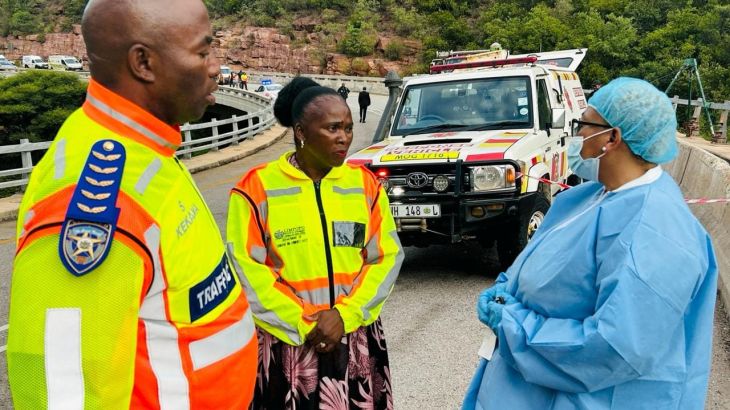
A bus has plunged off a bridge into a ravine in South Africa, killing 45 of the 46 passengers on board, according to the Department of Transport.
The only survivor, an eight-year-old girl, was airlifted to hospital but has not suffered serious injuries, according to a transport ministry media officer.
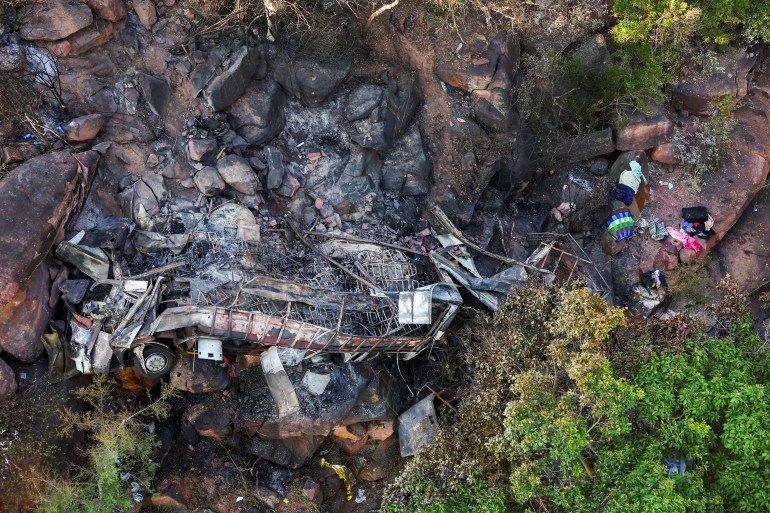
Police have said they are investigating a case of culpable homicide, with the driver among the dead after allegedly losing control and crashing through the barriers on a bridge in a mountainous area near Mamatlakala, 300 kilometres (190 miles) north of Johannesburg.
The bus plunged 50 metres (164 feet) into a ravine before bursting into flames.
Keep reading
South africa’s ex-president jacob zuma barred from may elections, 45 killed as bus plunges off bridge in south africa, jacob zuma election ban: how does it affect south africa’s election, south africa’s ex-president zuma escapes unharmed from car crash.
The bus was on its way from neighbouring Botswana to Moria, a town in northern Limpopo province that holds a popular Easter festival. Easter Sunday falls on March 31 this year.
South African police confirmed that 15 men and 31 women on board were Botswana citizens.
Transport Minister Sindisiwe Chikunga travelled to the scene of the crash and promised a full inquiry.
“We want really to extend our heartfelt condolences to the families but also to the government of Botswana and to the people of Botswana, and as South Africa, we will try everything to assist so that they go back to their country and families to be buried with dignity,” she was quoted as saying by national broadcaster SABC.
Transport ministry media officer Vongani Chauke told the news agency AFP that family members were “coming to the country to visit the surviving girl.”
“She’s fine, receiving medical attention and does not have serious injuries,” he said.
South African President Cyril Ramaphosa sent his condolences to Botswana and promised support, his office said in a statement.
Search operations were continuing at the site, but many bodies were burned beyond recognition and were still trapped inside the vehicle.
While South Africa has one of the African continent’s most developed road networks, it also has one of the worst safety records.
A few hours before the crash, Ramaphosa had appealed to South Africans to take care when travelling during the Easter holidays.
“Let’s do our best to make this a safe Easter. Easter does not have to be a time where we sit back and wait to see statistics on tragedy or injuries on our roads,” he had said in a statement.
The president of Estonia, Alar Karis, took to X to extend “heartfelt condolences” to Masisi, adding that he was “deeply saddened by the news”.
The Turkish embassy in Gaborone said on X its “thoughts are with the families affected by this tragedy”.
- Share full article
Advertisement
Supported by
Girl, 8, Is Sole Survivor of Bus Plunge: ‘No One Can Explain This Miracle’
Forty-five church pilgrims from Botswana, along with the driver, were killed when the bus plunged off an overpass into a rocky ravine in South Africa. The only survivor was a little girl.

By John Eligon and Yvonne Mooka
Reporting from Molepolole, Botswana
Lauryn Siako is the rare 8-year-old who springs out of bed to get herself ready for church, her family said. She loves the singing, the dancing, the worshiping.
So when leaders of her church announced that they were resuming the enormous annual Easter pilgrimage to church headquarters in South Africa this year, after a four-year hiatus for Covid-19, Lauryn pleaded with her mother to let her go for the first time.
Lauryn and her grandmother boarded a bus in their home village of Molepolole, Botswana, on Wednesday night with 43 fellow members of the St. Engenas Zion Christian Church, excited for the experience of a lifetime.
But by the following morning, Lauryn was the only one of the 45 passengers still alive.
The driver lost control of the bus on a sharp turn, and it careened off a high overpass on Mmamatlakala Mountain in northeastern South Africa, plunging 165 feet into a rocky ravine and bursting into flames. The driver and all of his passengers perished, except, inexplicably, the stringy girl who had just received her passport a week before the trip and had guarded it closely. She escaped with minor lacerations, South African health officials said.

“How did she come out of that bus?” Lauryn’s tearful mother, Gaolebale Siako, said on Friday, sitting in the modest home where Lauryn had lived with her grandmother in Molepolole, repeating a question she has been asking herself over and over.
“It’s hard to explain,” she added. “I’m hurt that I lost my mom and other people, but I’m also comforted knowing that my child is alive.”
As investigators continued searching for remains and answers as to what happened on Friday, church members questioned how the bus ended up on a treacherous, winding mountain road that they had never taken before in many journeys to the church headquarters in Moria, South Africa.

DESTINATION
Johannesburg
south africa
Kabelo Joseph Selome, a local ward councilor and a cousin of Lauryn’s mother, said in an interview in Botswana that the bus had been following two cars carrying church elders. But when the cars took a turn, the bus failed to follow — suggesting that the bus driver was lost, said Mr. Selome, who had spoken with the elders.
The police were investigating the crash as a case of culpable homicide, according to a statement, though they did not provide further details.
Emergency responders found Lauryn outside the bus with minor lacerations to her arms, legs, head and back, said Thilivhali Muavha, a spokesman for the chief health official in Limpopo Province, where the crash occurred. She was in stable condition on Friday, Mr. Muavha said.
Mr. Muavha said the authorities had not yet determined how the girl was able to survive such a devastating crash.
“All we can say is that we are happy that she was found alive,” he said.
The family has been speculating about how Lauryn survived, said Ms. Siako, 38. They wonder whether Lauryn’s grandmother, Onkemetse Siako, 61, threw her out of the window before the crash.
“No one can explain this miracle,” said Mr. Selome, the cousin.
The family learned at a briefing with police officials from Botswana on Friday, Mr. Selome said, that Lauryn had provided a lot of information to the South African authorities. She told them where the bus was coming from and where it was going, and even gave them her mother’s phone number.
The family now wonders whether God saved the young girl so that she could assist the authorities.
Lauryn was her grandmother’s favorite because she was so obedient, relatives said. The two lived together while Lauryn’s mother was away working, and they were inseparable. She got her cooking skills and independent mind from her grandmother, they said. She would wash and iron her own clothes and cook for the family — she baked bread the morning of the trip.
Lauryn was ranked second in her class, relatives said. She wanted to perform in a beauty pageant at school, but she was not picked because she walked too slowly and with her shoulders slumped, said her mother, who works as a safety and health official at a construction site.
Her mother told her to prepare not to sleep much at the Easter gathering. The praying, singing, dancing and prophesying happens on a field at night, and the energy is so high that the congregants rarely go to bed.
Ms. Siako said there was always a lot of excitement in simply traveling to the Easter gathering, which attracts millions of worshipers, and in seeing all the buses gathered at Moria.
The Zion Christian Church split into two branches in the middle of the 20th century after a dispute between the founder’s sons. Members of the St. Engenas branch wear a badge with a dove, while the other, larger branch, simply called the Zion Christian Church, wear a star. Their beliefs are virtually the same, said Joel Cabrita, a history professor at Stanford University in California, who has written a book about the church. They belong to a broader Zionist Christian movement in Africa that counts around 15 million members, the largest denomination in southern Africa.
While the St. Engenas branch decided to restart its pilgrimage this year, the other branch still has not.
The South African police confirmed on Friday that the passengers on the bus, along with the driver, were citizens of Botswana making the journey from Molepolole, a village that is considered the gateway to the vast Kalahari Desert.
As of Friday afternoon, 34 bodies had been recovered, the police said. Only nine of them were identifiable, with the others burned beyond recognition.
The tragedy cast a cloud over Botswana, a heavily Christian nation of about 2.5 million that was preparing to celebrate the Easter weekend.
Ms. Siako and other relatives said they worried about how this tragedy would affect Lauryn’s mental state. It is unclear when family members might be able to travel to South Africa to visit her in the hospital, or when she will be able to return home.
“I cry a lot,” Ms. Siako said. “I’m just worried, how is she right now?”
She said she pictured her daughter alone at the bottom of the ravine after the crash, and wondered whether she was scared and crying. “I’m asking myself,” she said, “did she even see what really happened?”
Ultimately, though, the miracle of Lauryn’s survival might be all this devastated community has to help it heal right now.
“This girl, just her being alive, is comforting the whole family,” Mr. Selome said. “This girl is giving us strength.”
John Eligon is the Johannesburg bureau chief for The Times, covering a wide range of events and trends that influence and shape the lives of ordinary people across southern Africa. More about John Eligon
- Skip to main content
- Keyboard shortcuts for audio player
A bus plunges off a bridge in South Africa, killing 45 people
The Associated Press

In this image taken from video provided by eNCA, a bus carrying worshippers headed to an Easter festival plunged off a bridge on a mountain pass and burst into flames in Limpopo, South Africa, on Thursday killing multiple people, authorities said. AP hide caption
In this image taken from video provided by eNCA, a bus carrying worshippers headed to an Easter festival plunged off a bridge on a mountain pass and burst into flames in Limpopo, South Africa, on Thursday killing multiple people, authorities said.
CAPE TOWN, South Africa (AP) — A bus carrying worshippers headed to an Easter festival plunged off a bridge on a mountain pass and burst into flames in South Africa on Thursday, killing at least 45 people, authorities said.
The only survivor of the crash was an 8-year-old child, who was receiving medical attention, according to authorities in the northern province of Limpopo. They said the child was seriously injured.
The Limpopo provincial government said the bus veered off the Mmamatlakala bridge and plunged 50 meters (164 feet) into a ravine before busting into flames.
Search operations were ongoing, the provincial government said, but many bodies were burned beyond recognition and still trapped inside the vehicle.
Authorities said they believe the bus was traveling from the neighboring country of Botswana to the town of Moria, which hosts a popular Easter pilgrimage. They said it appeared that the driver lost control and was one of the dead.
Minister of Transport Sindisiwe Chikunga was in Limpopo province for a road safety campaign and changed plans to visit the crash scene, the national Department of Transport said. She said there was an investigation underway into the cause of the crash and offered her condolences to the families of the victims.
The South African government often warns of the danger of road accidents during the Easter holidays, which is a particularly busy and dangerous time for road travel. More than 200 people died in road crashes during the Easter weekend last year.
The Zionist Christian Church has its headquarters in Moria and its Easter pilgrimage attracts hundreds of thousands of people from across South Africa and neighboring countries. This year is the first time the Easter pilgrimage to Moria is set to go ahead since the COVID-19 pandemic.
- South Africa
South Africa bus crash leaves at least 45 dead after vehicle plunges off bridge and catches fire
A bus in South Africa has plunged off a bridge into a ravine and caught fire, killing 45 of the 46 people on board, the transport ministry says.
An eight-year-old child was the sole survivor and had been taken to hospital with serious injuries.
The vehicle had been heading from neighbouring Botswana to Moria in the north of the country, the ministry said in a statement.
"It is alleged that the driver lost control, colliding with barriers on the bridge, causing the bus to go over the bridge and hitting the ground, where it caught fire," the statement said.
The people on board were reportedly travelling to Moria for the Easter weekend church service, the ministry said.
Rescue operations continued until the late hours of Thursday (local time), with some bodies burned beyond recognition, and others trapped inside the debris or scattered over the crash scene.
The bus had a Botswana licence plate, local authorities said, but the nationalities of the passengers were still being checked.
Transport Minister Sindisiwe Chikunga went to the scene of the crash and promised a full inquiry would be held into its cause.
While South Africa has one of the African continent's most developed road networks, it also suffers from one of the worst safety records.
Several hours before the crash, President Cyril Ramaphosa appealed to South Africans to take care when travelling during the Easter week.
"Let's do our best to make this a safe Easter," he said in a statement.
"Easter does not have to be a time where we sit back and wait to see statistics on tragedy or injuries on our roads."
The bus fell from a major bridge linking two hillsides near Mmamatlakala in Limpopo province, about 300 kilometres north of Johannesburg.
- X (formerly Twitter)
- Disasters, Accidents and Emergency Incidents
- South Africa

IMAGES
COMMENTS
Travel from Queenstown to East London. Travel from Grahamstown to East London. Travel from Port Shepstone to Durban. Travel from Margate to Durban. Travel from Paarl to Queenstown. Find bus tickets online for your next trip to South Africa. Compare the prices of bus companies (Eagle Liner, Eldo Coaches, Intercape) and book with Busbud today.
Highly recommended, Oasis Overland offers a 17-day trip from Cape Town to Jo'burg that takes in most of the main sights, including Addo, Royal Natal National Park and even a visit to the mountain kingdom of Lesotho, for about R29,050. If you want to make South Africa part of a once-in-a-lifetime African trip, look into the 93-day Grand ...
Intercape Busses offers intercity bus transport throughout Southern Africa and strives to improve the mobility of people in Southern Africa. ... Intercape routes cover South Africa's towns, cities—safe delivery, 48hr collection guarantee. Find Out More InterCity Travel For over 40 years Intercape has been the preferred choice of intercity ...
Cheap bus tickets in South Africa Find fast and cheap bus tickets for all major routes and bus companies. Most popular bus routes View all. ... Like all children, between two and 11 years old, can travel by Greyhound South Africa with 15% off. Disabled persons and/or with limited mobility can get free help at the bus terminal and on the bus.
Bus travel options to, from and within South Africa. The Best Deals Save up to 70%. The Most Choices Millions of routes worldwide. Easy and Transparent Compare offers with 1 click. South Africa is home to towering mountains, a dramatic coastline, vineyards and has eleven official languages. The country's diverse wildlife is what attracts so ...
What is Bazbus? Bazbus has become THE way to travel around South Africa in a safe, flexible, and fun way! A South African institution since 1995, Bazbus covers the major tourist destinations, but our drivers also know the hidden gems, the stops between the stops that tourists would never find, and are also happy to share stories of what life ...
Bus travel in Africa is an adventure. Last year, I backpacked from Ethiopia to South Africa pretty much all by public bus. For many of the bus routes that I traveled, there just wasn't much information online. The following step-by-step African bus guides include information on bus companies, pricing, departure and arrival times, border ...
T T he extensive road network in South Africa means that bus or coach travel is a simple and often very cost effective option for travellers. It has become the go-to travelling option for the more economically-conscious locals and many international travellers choose coach tours or bus travel as a hassle free option.
Buses to Bloemfontein. Buses to Mthatha. Buses to Port Elizabeth. Buses to East London. Buses to Queenstown. Buses to Pietermaritzburg. Find bus tickets online for your next trip to South Africa. Compare the prices of bus companies (Eagle Liner, Citiliner, Greyhound Mega Coach) and book with Busbud today.
Search and Book Cheap Bus Tickets. One Way Return. From. To. Departure. Return. Passengers. * Infants traveling on adults' laps are free of charge and limited to one per passenger.
There are a few ways to travel within South Africa. Planes (you will miss a LOT of stops not served by Airports, such as all the garden route stops) ... Book 1 single bus pass that covers ALL bus journeys - no need to research bus tickets and routes! Hop on the bus at your Start Destination - we pickup at your hotel/hostel, no taxis needed! ...
Travelstart offers you a convenient and affordable way to book buses online. Compare prices and schedules from different bus operators and find the best deal for your destination. Whether you need a one-way or a return ticket, you can book it easily with Travelstart.
Everything About Bus Travel in Southern Africa. Southern Africa is a region rich with cultural and geographical diversity. From the wildlife-filled plains of Zimbabwe to the cosmopolitan cities of South Africa, there are endless opportunities for exploration and discovery. The region is home to a myriad of ethnic groups, each with its own ...
INTERCITY TRAVEL. For over 40 years Intercape has been the preferred choice of intercity travel throughout Southern Africa. From semi-luxury to ultra-luxurious coaches, we offer our passengers with safe, dependable and affordable travel to over 100 destinations. Book a Ticket.
Travel by bus, book bus tickets online with Greyhound, South Africa's favourite affordable luxury coach solution featuring the luxury Dreamliner and Greyhound single decker. ... Since 1984 Greyhound has brought you South Africa's favourite luxury coach solution, connecting cities as old as the country itself and towns as brilliantly curious ...
Bus fares are generally considerably cheaper than flying or driving. As an example, a bus trip from Cape Town to Johannesburg costs on average R 680, while a flight costs on average R 2449. Scenic Routes. South Africa has diverse landscapes, and bus travel offers stunning views of mountains, forests, beaches, and wildlife reserves.
South Africa is a large country with fairly lengthy intercity travel times by road or rail. For example, traveling from Cape Town to Johannesburg takes 18 hours by bus, 30 hours by train, or just two hours by air.
Several bus companies offer the quickest trip by regular bus from Johannesburg to Cape Town (InterCape, Eagle Liner, Eldo Coaches and InterCity Liners). It takes about 17 hours. The longest bus route from Johannesburg to Cape Town takes 26 hours and is offered by InterCape. The BazBus route takes several days from Johannesburg to Cape Town ...
The most popular Baz Bus option is the unlimited one-way hop-on/hop-off pass. It costs 3,700 ZAR and covers the 750 kilometer distance between Port Elizabeth and Cape Town. You have no time limit and have unlimited travel in one direction, allowing you to have as many stops as you want. A return pass costs 4,800 ZAR.
The traffic in larger cities may affect departure and arrival times. The shortest travel time by bus from Johannesburg to Durban is 6 hours and 45 minutes, while the average duration of this trip is 10 hours and 15 minutes. Several bus operators offer the shortest route from Johannesburg to Durban, taking 6 hours and 45 minutes.
The Baz Bus is a backpacker bus service in South Africa that connects many of the popular travel destinations around the country. For many travellers it's an attractive and convenient option, though after using it on my South Africa trip I realized it does have some shortcomings.. If you're used to backpacking by public transportation then Baz Bus is probably the obvious choice, though it ...
Discounted bus tickets for travel? Book easily within and across African countries.
Bus. Tourists have been mugged and assaulted in and around bus stations. Avoid the central bus station in Johannesburg. ... Regional travel. If you leave and re-enter South Africa, even for a short time, you will not automatically be given an additional 90-day visitor's visa. An immigration official can deny you re-entry into South Africa.
1:27. Forty-five people aboard a bus to Easter church service in South Africa's Limpopo province died in a fiery crash, authorities said Thursday. Only an 8-year-old child survived the crash and ...
A bus has plunged off a bridge into a ravine in South Africa, killing 45 of the 46 passengers on board, according to the Department of Transport. The only survivor, an eight-year-old girl, was ...
Forty-five church pilgrims from Botswana, along with the driver, were killed when the bus plunged off an overpass into a rocky ravine in South Africa. The only survivor was a little girl. By John ...
AP. CAPE TOWN, South Africa (AP) — A bus carrying worshippers headed to an Easter festival plunged off a bridge on a mountain pass and burst into flames in South Africa on Thursday, killing at ...
A bus in South Africa has plunged off a bridge into a ravine and caught fire, killing 45 of the 46 people on board, the transport ministry says.
A bus crash in South Africa's northern province of Limpopo resulted in 45 deaths and one serious injury, South Africa's Department of Transport said on Thursday.
Forty-five people have died in South Africa after the bus they were in plunged some 50m (165ft) off a bridge into a ravine, authorities say. ... Bus travel; South Africa; More on this story. Tour ...